
Corporate Strategy
Delivering on our Strategic Objectives
Message from the Chief Executive
"Mindful of the dynamic context, we will maintain our disciplined approach to the execution of our strategic plans …"
We registered excellent results for the year ended June 2019, with further headway made at the level of both the banking and nonbanking clusters, more particularly on the international front. Profit attributable to equity holders grew by 31.3% to reach Rs 9,482 million, with the combined share of foreign-sourced income and non-banking operations standing at 69% thereof. As a result, earnings per share rose from Rs 30.26 to Rs 39.70.
Underpinned by our diversification strategy, operating income increased by 19.3% to reach Rs 20,226 million. This was supported by a growth of around 21% in net interest income, which benefitted from enhanced performances across banking subsidiaries. In particular, MCB Ltd registered a significant expansion of its international loan book and improved yields on Government securities. Net fee and commission income grew by 10% to reach Rs 3,786 million as a result of enhanced contribution from MCB Capital Markets Ltd and higher revenues across banking subsidiaries, with strong growth recorded with regard to our Energy and Commodities business and payments services. In spite of a subdued performance in respect of profit on exchange and lower gains on disposal of investments by MCB Equity Fund Ltd, ‘other income’ grew by 25%, principally due to fair value gains on equity instruments at the level of MCB Ltd and higher contribution from entities in the non-banking segment, mainly MCB Consulting Services Ltd and MCB Real Assets Ltd.
On the back of initiatives to strengthen our human capital and uplift our technological readiness, operating expenses increased by 10.4%. Yet, in view of our robust performance on the revenue front, our cost to income ratio declined by 3.0 percentage points to 37.1%.
Whilst the Group’s impairment charges rose by some 20%, the cost of risk in respect of loans and advances dropped marginally to 59 basis points of the latter. Asset quality further improved as gauged by our gross NPL ratio declining from 4.5% to 4.1%.
Notwithstanding a reduced contribution from Banque Française Commerciale Ocean Indien, Group results have also been supported by an increase of Rs 97 million in our share of profit of associates, explained by better performances by Société Générale Moçambique and Promotion and Development Group.
As another source of satisfaction, the Group has maintained robust foundations for the achievement of sound and sustainable business growth. We posted an improvement in our capital adequacy ratios, alongside maintaining healthy funding and liquidity positions.
Thanks to our sound credentials, Moody’s Investors Service has upgraded the rating of MCB Ltd from Baa3/P-3 to Baa2/P-2. The agency acknowledged the Bank’s disciplined and prudent expansion strategy, notably in Africa. Today, MCB exhibits the best long-term deposit rating amongst African commercial banks rated by the agency. We are confident that our improved credit profile will be a key element in assisting the Bank to further deepen and widen its regional footprint. In addition, as a testimony of the strong market confidence in our core fundamentals, MCB Ltd has, in April last, successfully secured a USD 800 million Dual Tranche Syndicated Term Loan Facility. This facility attracted commitments in excess of USD 1 billion from 24 participating banks spanning Europe, the Middle East and Asia. It represents the largest-ever syndicated facility in our history and marked our return onto the international debt markets after some 13 years.
On the domestic front, MCB Ltd has consolidated its leadership position, while effectively responding to the needs of its individual andcorporate clients. Toward this end, the Bank has continuously enriched its value proposition, underpinned by notable inroads made as regard its digital transformation and further innovation on the payments side. Beyond, the Bank has pursued its regional diversification agenda, with a significant expansion in exposures posted in respect of Energy and Commodities financing and international structured finance. The Group’s foreign banking subsidiaries have pursued their business strategies across targeted markets, backed by an improved range of solutions, increased brand visibility and reinforced capabilities.
As for our non-banking entities, they expanded their activities and were increasingly involved beyond our local shores. While MCB Leasing Ltd and MCB Factors Ltd have maintained their prominent market positioning, MCB Capital Markets Ltd upheld its growth momentum in spite of the challenging operating environment. It completed a number of capital raising transactions locally and was increasingly active in advising African clients on their financing initiatives. The MCB range of funds, especially the USD-denominated fixed income funds, performed strongly relative to comparable funds, while assets under management increased year-on-year to reach USD 814 million despite a competitive environment. Indeed, the MCB Africa Bond Fund was ranked the top performing fund over a 3-year and 5-year horizon among more than 50 Africa focused funds tracked by Africa Global Funds.
Group entities have been
actively reinforcing
their foundations in order
to be in a position
to support sound
and sustainable growth.
Spanning the organisation as a whole, further progress has been made in showcasing our ‘Bank of Banks’ proposal aimed at positioning the Group as a regional hub for handling trade finance, payments and cards operations outsourcing services, alongside offering business solutions to financial service providers in Africa and Asia. MCB Consulting Services Ltd (MCBCS) dynamically pursued its progression in line with its ‘positively disruptive’ business strategy. As key achievements, it intervened in 7 new countries and signed new partnership agreements with global players. As for International Card Processing Services (ICPS), progress was made in providing multi-channel card and payment solutions to clients located in Mauritius, the Indian Ocean, Asia and key African economies.
Beyond, we have upheld our market diversification momentum, with a key development being the launch of our new Representative Office in the Dubai International Financial Centre. In addition, while MCB Microfinance Ltd made headway in fostering the financial inclusion and empowerment of small entrepreneurs, we established the MCB Institute of Finance Ltd which aims at promoting the financial knowhow of professionals and students by way of offering in-class and online courses via renowned international partners.
Group entities have been actively reinforcing their foundations in order to be in a position to support sound and sustainable growth. While making allowance for applicable regulatory rules and compliance requirements, we strengthened our risk and capital management framework, making notable inroads in embedding a strong compliance culture throughout the organisation by means of regular training and reporting. Particular attention was also devoted to effectively handle and mitigate cyber risks, in view of their rising prominence, with further reinforcement of our relative processes and investment in more robust technological infrastructure.
In line with our already well established philosophy, we have continued to upgrade our technological platforms and have kept our business processes under constant review with a view to improving cutomer relationships and efficiency, while building the capacity to be in a position to offer our clients new products which are adapted to their ever evolving needs. Some of our major business units, like Treasury and Private Banking and Wealth Management, have undergone major transformation programmes aimed at enabling the Group to take due advantage of the positioning of Mauritius as an International Financial Centre and pursue its business development endeavours on the regional scene.
Our Digital Transformation Programme, which was initiated last year, is gaining momentum and is being scaled up to formulate innovative customer journeys, alongside contributing to improve our operational efficiency levels, enhance the quality of customer interactions and sharpen our competitive edge across dedicated segments. We made good progress in implementing an agile way of working at the level of MCB Ltd and we have set up a Change Management Office to provide the necessary structure to facilitate the implementation of ongoing initiatives. Also, we have established a Data Office to help enhance the quality and accessibility of the data infrastructure in support of our strategic thinking process, while our Customer Lab contributes towards research, encourages co-creation with customers and develops innovative solutions.
We remain committed to providing
our employees with the right skills
and competencies to perform to the
best of their abilities …
Via our HR Transformation Programme, we aim to implement world-class practices and processes to attract, develop and retain our employees, with due emphasis laid on talent management, our leadership brand and strategic talent acquisition. While setting the necessary building blocks to gear up our workforce capabilities, we remain committed to providing our employees with the right skills and competencies to perform to the best of their abilities via tailored learning opportunities. A key endeavour is to further their professional advancement and resilience towards adapting to the fast-changing and increasingly competitive environment.
As a major player within the local economy and our region, we are conscious of the key role we can play in living and promoting sustainable behaviour. Towards the end of last year, we launched our Corporate Sustainability Programme: ‘Success Beyond Numbers’. This programme centres around three main pillars namely the development of a vibrant and sustainable local economy, the protection of the natural environment and promotion of our culture as well as the welfare of the society and its people. A number of initiatives have already been launched, including our ‘Lokal is Beautiful’ campaign aimed at local SMEs, and a comprehensive programme is currently being developed. Initial reaction to the programme from our staff has been very positive and has generated a very encouraging level of participation from them. It is hoped that we will be able to also rally our clients to this noble cause.
While the global landscape remains testing, the economic conditions across countries where the Group is involved warrant close attention, although interesting growth avenues subsist in niche segments across the African continent. Group entities remain confronted by stiff competitive pressures across specific markets, partly linked to the advent of new technologies. Indeed, the increasing prominence and dissemination of digitalisation practices across industries is contributing to reimagine the way we conduct our operations and reshape the customer relationship model. In the same vein, we are being exposed to a digitally-savvy young population, with the Group called upon to provide adapted solutions to meet the needs and aspirations of its customers and employees. Mindful of the dynamic context, we will maintain our disciplined approach to the execution of our strategic plans on the back of reinforced capabilities. We will continue to focus on the strengthening of our domestic position, on expanding our non-bank activities and on growing our international footprint, with the African continent remaining a key focus area.
To pursue our expansion endeavours, we will enrich our value proposition and provide increasingly connected experiences to our customers while ensuring continuous reinforcement of our risk management, internal control and compliance frameworks. We will remain focused on implementing our three ongoing major initiatives namely our Digital Transformation Programme, the HR Transformation Programme and the Corporate Sustainability Programme.
As a major player within the local
economy and our region, we are
conscious of the key role we can play
in living and promoting sustainable
behaviour.
Against this backdrop and in line with the pipeline of opportunities at hand, we expect Group results to improve further in the coming financial year, albeit at a reduced pace given the strong performance achieved this year.
I would like to thank our valued customers for partnering with us and I acknowledge the unwavering trust of our shareholders in our ability to create sustainable value for them. Furthermore, I would like to thank the members of the various Boards of the Group for their valued insights, guidance and oversight to help the organisation to move forward and achieve its targets. On this front, I cannot but have a special thought for Gerard Hardy, our former Chairman, who passed away in March last. During the 14 years that he spent on the Boards of various companies within the MCB Group he provided us with the necessary strategic guidance and direction to steer the Group forward. Notably, he has in FY 2013/14, played an instrumental role in overseeing the smooth restructuring of our organisation, becoming the first Chairman of MCB Group Ltd.
Our strong set of results would not have been possible without the support and dedication of our staff and of the Management teams of all Group entities. I wish to thank them for contributing to making things happen and meeting our set objectives.

Pierre Guy NOEL
Chief Executive

Introduction
Our positioning in FY 2018/19
The Group faced a dynamic and challenging context across the segments and geographies in which it operates. Against this backdrop, we took appropriate strategic decisions that helped us achieve sound and balanced growth across entities.
Our underlying thinking and approach
Integrated thinking is entrenched in the conduct of our business activities and our value creation process. We design, formulate and recalibrate our strategic objectives and intents after making an informed and holistic assessment of the multiple shifts taking place across the environments in which we operate, both locally and abroad. We ensure that our business development moves and initiatives are in alignment with our contemplated strategic trajectories. Overall, this consistent and committed approach allows us to pursue our business growth in a healthy and predictable way, while setting the stage for the timely and effective realisation of our targets and ambitions.

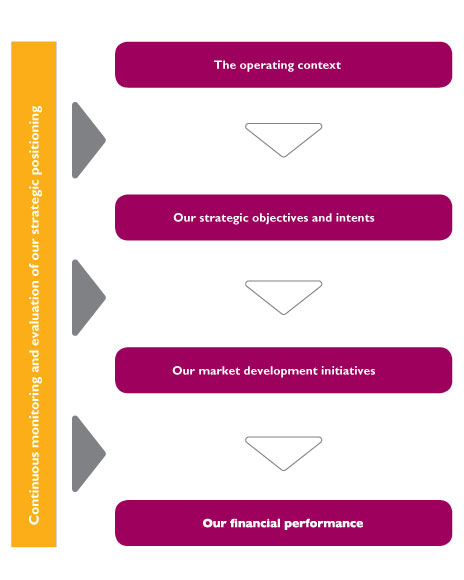
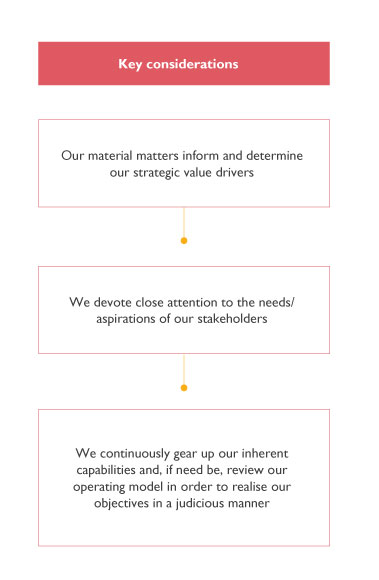
The operating context
Macroeconomic environment
Recent trends and developments
- Against the backdrop of the testing global landscape, growth in Mauritius remained in a challenging, yet resilient, zone. Real GDP growth at market prices is estimated at 3.8% in 2018, underpinned by a strong contribution from national investment. At the sectorial level, the figure reflects appreciable upturn in construction, expansions in the financial and business services, ICT and tourism industries, while being impacted by subdued performances by the domestic and export-oriented manufacturing industries. For 2019, growth should remain broadly unchanged on the back of the afore-mentioned dynamics, in particular given high public investment, though tourism should post a moderate expansion amidst the soft economic conditions prevailing in key markets. As for headline inflation, it pursued a downtrend to stand at 1.0% as at August 2019.
- As for sub-Saharan Africa, conditions are, as a whole, gradually recovering, with economic growth expected to reach 3.4% in 2019, from 3.1% in 2018. Whilst a less supportive external environment will continue to weigh on economic prospects, the foreseen recovery reflects notable growth in several non-resource intensive countries and higher commodity prices on average. Of note, while remaining volatile, oil prices have, on a point-to-point basis, declined during the last financial year, but have generally increased in recent weeks amidst geopolitical tensions.
- Mixed economic conditions have been observed across foreign countries where the Group is present. In Maldives, economic growth remains in a robust gear, driven by a solid expansion in tourism, commerce and construction activities. In Seychelles, macroeconomic fundamentals are generally sound, although growth is expected to narrow in 2019 given the country’s vulnerability to external shocks. As for Madagascar, the economic context stayed generally favourable lately, notwithstanding uncertainties linked to the electoral cycle in the recent past. Moreover, GDP growth in Mozambique slowed in 2018 owing to lower mining output and is set to decelerate further in 2019 after tropical cyclones hit the country. In Reunion Island, growth narrowed lately, mainly due to lacklustre investment and a drop in exports, amidst the yellow vests movement.
Key economic indicators
Implications for our strategy and business activities
- Amidst the generally demanding context, the Group has adopted a thoughtful growth agenda, while reinforcing its market vigilance in order to adequately appraise and respond to the needs and expectations of its individual and corporate customers.
- Alongside further diversifying business activities across markets and regions, the Group has tapped into growth opportunities prevalent across niche segments and areas where it displays strategic competencies, after capitalising on its adapted value proposition.
Market environment
Recent trends and developments
- Notwithstanding the challenging landscape, the banking and financial systems in Mauritius and our foreign presence countries have been characterised by healthy financial soundness metrics during the last financial year. The authorities remained particularly intent on modernising the monetary policy set-up, foreign exchange operations framework and payments system.
- Demand for credit has maintained an appreciable growth trajectory in Mauritius and our foreign presence countries, although moving at a relatively different pace. As for asset quality levels prevailing within the banking industries pertaining to the Group’s presence countries, they have continued to be subject to pressures, albeit improving in Seychelles.
- In spite of remedial measures taken by the Bank of Mauritius via conduct of open market operations, relatively high liquidity levels have prevailed in the banking system in Mauritius. After having edged up for some time, yields on short-term securities have witnessed a relative decline in recent months amidst the persistence of imbalances within the money market. It can be added that high liquidity conditions have also warranted attention in our foreign presence countries.
- Of interest to both the banking and non-banking entities of the Group, competitive pressures remained relatively high in some markets. In Mauritius, such challenges subsisted mainly in the mortgage and cards segments, while operators enriched their digital and wealth management solutions. Banks also pursued their regional diversification strategies. Of significance also, the Bank of Mauritius has, as from 1 August 2019, offered Silver Savings Bonds and Silver Retirement Bonds for sale to enable the elderly improve return on savings and encourage savings towards retirement.
- Generally accommodative monetary policy conditions have been upheld in our other presence countries amidst easing inflationary pressures and mixed economic conditions. In Mauritius, the Bank of Mauritius has, in August last, cut the Key Repo Rate by 15 basis points to 3.35%, after making allowance for the worsening global economic outlook.
Key banking sector metrics
Implications for our strategy and business activities
- The organisation has adopted dedicated moves to respond to the exigent market and competitive environments. It pursued judicious assetliability management, unlocked opportunities for innovation, bolstered its competitive edge and diversified its positioning across segments. In particular, it has further improved its value proposition, while entrenching the latter on a customer-centric approach.
Legal and regulatory environment
Recent trends and developments
- The legal and regulatory environment facing the Group remains dynamic and is becoming increasingly demanding.
- Amongst key stipulations of interest to MCB: (i) the Guideline for the write-off of non-performing assets was revised to provide for a broad framework and specific requirements for the write-off process at financial institutions to ensure consistency and prudence across the exercise; and (ii) the Guideline on Credit Impairment Measurement and Income Recognition was amended to align prudential requirements pertaining to asset classification and provisioning requirements with advocated provisions of IFRS 9.
- To consolidate oversight of banking players and while gradually moving away from the current compliance-based set-up, the BoM embarked on the adoption of a full-fledged risk-based supervisory framework. It includes a specific module on Money Laundering/Fighting against Terrorism risks, which reflects the increasing emphasis being laid by the authorities to tackle such risks, as it can additionally be gauged by (i) the setting up, by the Central Bank, of a dedicated unit to monitor such matters by means of off-site surveillance and on-site examinations; and (ii) the passing of the Anti-Money Laundering and Combatting the Financing of Terrorism and Proliferation Act 2019, which amended various enactments with a view to meeting relevant international standards.
- The Office of the Ombudsperson for Financial Services has recently been set up, with the body mandated to, in particular, deal with complaints received from consumers of financial services and make an award for compensation where appropriate. In the same vein, the Bank of Mauritius has proceeded with the implementation of the recommendations of the ‘Banking Your Future: Towards a Fair & Inclusive Banking Sector’ report. The declared objective of the latter is to achieve a fairer and more inclusive banking sector, with specific instructions having been issued to banks after consultations with the Mauritius Bankers Association.
- On the fiscal front, the following are worth noting: (i) for banks in operation as at 30 June 2018, the special levy – which, effective year of assessment commencing 1 July 2019, is administered under the Value Added Tax Act – has been increased from 4% to 4.5% of leviable income (i.e. net interest income and other income from banking transactions with residents only) for operators having net operating income exceeding Rs 1.2 billion; and (ii) effective year of assessment starting 1 July 2019, the relief for tax credit available to banks on foreign sourced income will no longer be available, with corporate tax rates as follows: (a) a tax rate of 5% on the first Rs 1.5 billion of chargeable income; (b) 15% for amount exceeding Rs 1.5 billion; and (c) a reduced tax rate of 5% on the amount of the current year chargeable income exceeding that of the base year if the specified conditions are met.
- The Mauritius Deposit Insurance Scheme Act was approved by Parliament and received Presidential Assent in April 2019. It aims at better protecting the interests of depositors and to guarantee the repayment of their deposits, up to Rs 300,000 per insured depositor and per member institution, in case of failure of a bank or non-bank deposit-taking institution licensed by the Central Bank. Of note, however, the legislation has not yet been proclaimed, with the BoM currently working on its operational aspects.
- With regard to our foreign presence countries, Central Banks have pursued their efforts to strengthen the regulatory oversight of operators and consolidate their respective industries. This contributed to maintain financial stability, backed notably by the emphasis laid on strengthening compliance requirements, measures to combat anti-money laundering and financial education.
Implications for our strategy and business activities
- In the light of observed developments, the Group strived to appropriately ascertain the significance of legal and regulatory stipulations for relevant entities, while proactively engaging with regulators. Entities strengthened their risk management and compliance capabilities to ensure strict adherence to mandatory rules and advocated norms, backed by reinforced processes and frameworks.
Technology and society
Recent trends and developments
- Key developments taking place on the technological front, in the advent notably of Artificial Intelligence, Big Data analytics and Blockchain technologies, are increasingly disrupting traditional business models and stakeholder relationships.
- Technological developments are calling for new strategic partnership models to be forged amongst business players, including banks and technological companies, alongside necessitating upgrades to both front and back-office operations. In Mauritius, regulators are also gearing up to keep pace with the evolving context. The BoM implemented the National Payment Switch to further modernise the relevant infrastructure for improved efficiency, safety and soundness. In the same vein, it launched the Mauritius Central Automated Switch. It is a national payment platform that operates round the clock, while setting the stage for the implementation of an Instant Payment System. As for the Financial Services Commission, it released a set of rules, which positioned the Mauritian International Financial Centre as the first jurisdiction globally to offer a regulated landscape for operators holding a Custodian Services (Digital Asset) Licence.
- In the context notably of demographic changes and the rise of the millennials, the lifestyles, behaviours, attitudes and aspirations of customers are changing at a rapid pace, with increased emphasis laid on personalised solutions and instantly accessible services. This situation is instigating heightened competitive pressures across markets segments.
Implications for our strategy and business activities
- The Group has set out to provide increasingly adapted solutions, alongside reimagining customer experiences. It further modernised information systems and digital channels, backed by the adoption of scalable, efficient and flexible platforms. It has forged meaningful collaboration and partnerships with relevant stakeholders toward contributing to the creation of impactful ecosystems.
- The Group has reinforced its data management and analytics capabilities in order to unearth organisation insights and support strategic moves. It has strengthened its risk management and internal control capabilities so as to preserve its information security and reputation, while gearing up to tackle potential cyber threats and protecting consumer data amidst all circumstances.
Positioning ourselves for growth and success
Overview
Our strategy is geared towards creating sustainable value. Anchored on our proven business model and while guiding our allocation of resources, our strategy paves the way for delivering strong earnings growth and sound financial metrics, alongside ensuring that we operate within the precinct of our risk appetite. While transforming the Group into a simpler and better organisation, we aim to deliver exceptional customer service and tap into business development opportunities locally and abroad.
Concomitantly, a key objective of the Group is to embed sustainability principles in the way we do business, alongside integrating it in our culture, values and processes, in line with our objective to be a responsible corporate citizen.
Our main strategic objectives



Our key focus areas
General thrusts
- Maximise long-term value creation for our multiple stakeholders
- Preserve the image, reputation and franchise of the Group
Specific targets
- Help promote the socio-economic development of Mauritius
- Increase our share of foreign-source income, while positioning the Group as a competitive regional financial player
- Actively and thoughtfully pursue our Africa Strategy, alongside exploring business avenues beyond
- Enrich the appeal of our value proposition across markets, backed by an innovative mindset
- Capitalise on synergies and partnerships within the organisation and with external parties

Our promise to creating a differentiating customer experience
To enrich customer experience at all touchpoints
To be coherent and simple in our approach
To stay innovative in our offerings
To empower customers in realising their aspirations
To simplify and streamline our operations
Our governance and processes
- MCB Group has a well-defined governance framework as well as coherent processes and practices to facilitate strategy elaboration, execution and review. The Board sets the strategic directions of the Group, approves strategic policies and ensures that they are communicated throughout the organisation.
- The Board is assisted by the Strategy Committee which, inter alia, makes recommendations on development strategies, assesses strategic opportunities, follows up on Group-wide initiatives and ensures that strategy execution is backed by adequate resources and structures.
- While ensuring congruence with strategic directions set at Group level, the entities formulate their own strategic orientations, which are cast in a 3-year rolling plan and endorsed by the Board at the start of each financial year.
- Alongside being subject to relevant regulatory and compliance requirements, the entities determine their strategic initiatives after taking on board the inherent specificities and exigencies of the markets in which they operate as well as the relevant challenges and opportunities characterising the businesses they pursue.
- When contemplating their strategic directions, entities make allowance for the risk appetite, as formulated across segments, while considering their capital position as well as the scale and proficiency of their physical and human resources. In their functioning, entities capitalise on Group synergies, while the services of external consultants are selectively leveraged to provide entities with competent tools and guidance in order to sustain their thinking and decision-taking process. Of note also, key priorities and performance indicators are formulated with a view to providing clarity and direction towards supporting the smooth deployment of envisioned initiatives. Entities have their own strategic planning processes. In respect of banking entities, they have a similar planning process, with the one applied by MCB Ltd depicted as follows.

Strategic orientations and objectives across clusters and entities
Our long-term destination
A strong and innovative regional financial player within a diversified Group
Our short to medium term strategic orientations
Extend our frontiers
Deliver a world-class customer experience through digital
Nurture our values and deliver on our brand promise
Our key objectives and strategic focus areas
- Consolidate the Bank’s leadership position domestically
- Further increase our share of foreign-sourced income, with focus on pursuing our regional diversification agenda
- Help position the Group as a financial hub, after leveraging Mauritius as an International Financial Centre of repute and substance
- Entrench sustainability principles in the Bank’s activities and operations
Key pillars
- Building an Energy & Commodities hub
- Expansion of private banking into Africa
- Development of structured finance
- Facilitating the ‘Bank of Banks’ proposition
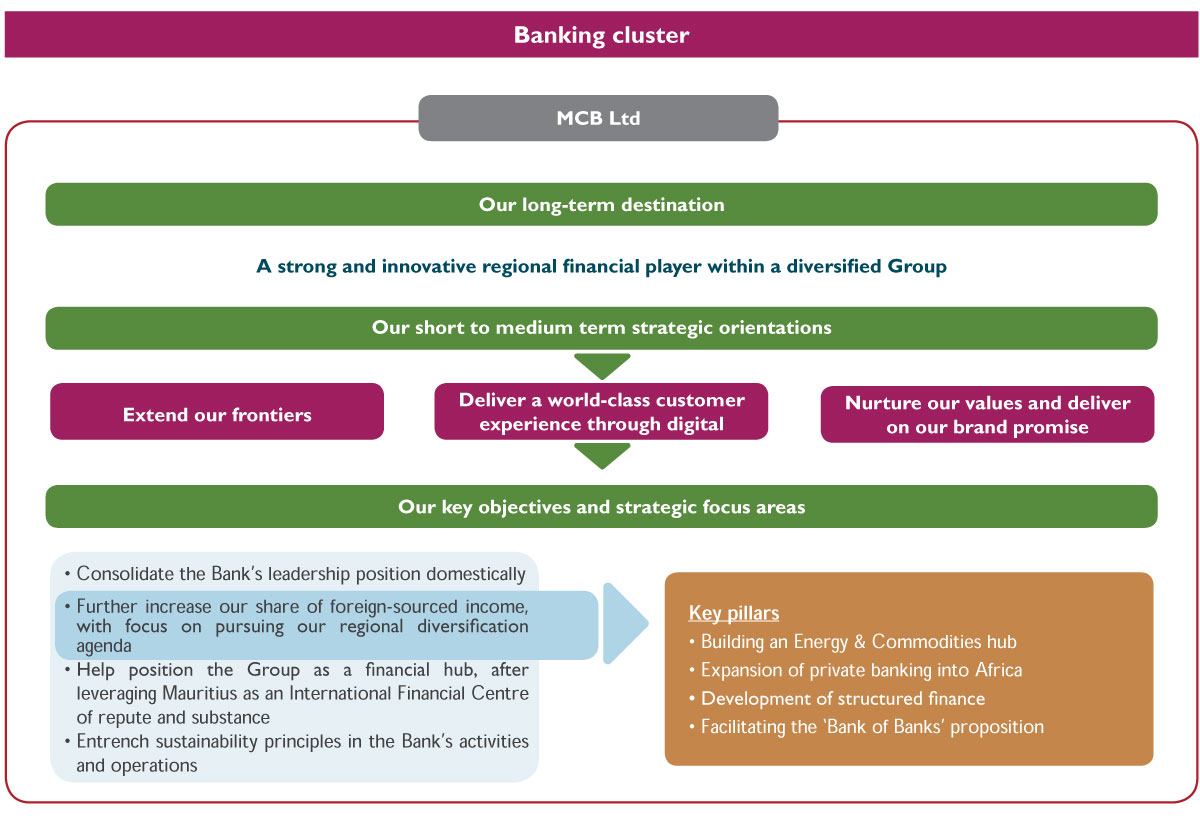
Foreign banking subsidiaries
- Increase market shares across retail and corporate segments, while positioning the entities as trusted banking partners
- Expand activities across new and emerging customer segments, with the affluent market as a key focus area, while reinforcing proximity with small and medium enterprises
- Lay greater emphasis on the adoption of digital and innovative practices, backed by the implementation of mobile banking service and upgrades to multi-channel payment platforms (e.g. Internet Banking, ATMs, POS, E-commerce)
- Improve customer experiences and widen the range of offerings to enrich the value proposition, notably relating to card solutions, retail loan facilities as well as new offerings to boost the corporate segment, notably structured financing solutions
- Leverage solutions developed by MCB Ltd in the entities’ presence countries, backed by service level agreements
- Expand physical footprint for increased market presence, while growing and modernising the branch network
‘Non-banking financial’ and ‘other investments’ clusters
- Reinforce the positioning of the Group as an integrated financial services provider locally and in the region
- Leverage the brand franchise and distribution capacity of the organisation to consolidate our positioning across long-established business areas (notably those relating to the provision of investor, factoring and leasing services), while diversifying our activities
Zoom on selected entities
- Focus on advising blue chip clients locally and arranging financing for transactions and projects in Africa
- Broaden investment management activities to alternative assets
- Invest in private equity and hybrid debt opportunities alongside partners in Africa
- Seek strategic alliances with selected partners to expand our distribution channels and strengthen our technical capabilities
- Widen the range of offerings and revamp existing products to enrich the value proposition, alongside diversifying the customer base
- Forge strategic alliances with key stakeholders, including car dealers and fleet management companies
- Maintain and nurture close relationships with business lines of MCB Ltd
- Consolidate its position in the receivables finance market by leveraging latest technological solutions and diversifying products
- Offer advisory and ‘service-only’ solutions that are customised to domestic and international businesses
- Enhance synergies with MCB Ltd to offer best-fit solutions to clients
- Consolidate the democratisation of access to credit by micro-entrepreneurs and promote financial inclusion
- Foster economic empowerment of micro-businesses and contribute to sustainable development
Develop and invest in a diversified portfolio of prime real assets with a view to seeding property yield funds to be offered to various customer segments
- Look at opportunities in emerging markets and diversify country positioning
- Deploy initiatives in respect of client experience by means of dedicated relationship management, the provision of customised and scalable payment solutions, the development of human capital, and the streamlining of our operations
- Provide solutions to wider customer base (e.g. MasterCard and Visa (EMV) issuing and acquiring, transaction processing, EMV debit, credit, corporate and prepaid card issuance, Card personalisation bureau service, ATM/POS driving, mobile payment solution)
- Expand our reach in Africa and Asia by capitalising on our position as a recognised and trusted partner in delivering payment solutions to banks and financial institutions and tapping into synergies with Group entities which are involved on the African and Asian continents
- Become a preferred and trusted business enabler, while positioning itself as leader across earmarked spheres of activity
- Consolidate footprint in existing markets and probe into new territories, notably in Asia-Pacific region
- Strengthen partnerships with and operational assistance to financial institutions, particularly in Africa
- Further exploit the potential of existing services and launch new ones (e.g. analytics and business process re-engineering)
- Nurture collaboration with relevant stakeholders in order to more effectively support business growth, while implementing the necessary frameworks and processes to monitor the performance of sealed agreements
- Increase market visibility
Creating value in a sustainable way for the benefit of our stakeholders
Our key foundations
Our proactive stakeholder engagement model informs and guides our actions and behaviours. While embracing an integrated vision that aims at providing a solid contribution to the advancement and prosperity of the Mauritian society and economy, we seek to consistently make sense of and respond to the needs and expectations of our multiple stakeholders.
![]() Read more in Sustainability Report
Read more in Sustainability Report
The Group has a well-established governance and operational framework to ensure that engagement with stakeholders is managed in a transparent and impactful way, in alignment with international practices and regulatory stipulations. Stakeholders are kept informed about the Group’s business and strategy on a regular basis through various channels. Their views and concerns, notably gathered through ongoing dialogues, meetings and surveys, are considered in the Group’s decisions, with material issues escalated to the Board. The organisation’s activities underlying its stakeholder value creation are anchored on sound foundations. The employees of MCB Ltd abide by the Bank’s Code of Conduct and the National Code of Banking Practice. Reflecting its commitment to entrench applicable principles in its strategy and operations, MCB Ltd is an adherent to the United Nations Global Compact at participant level. The latter is the world’s largest voluntary corporate responsibility initiative for businesses committed to aligning their operations and strategies with universally accepted principles in the areas of human rights, labour, environment and anti-corruption. Since August last, MCB Ltd is one of the founding signatories of the Principles for Responsible Banking of the United Nations Environment Programme – Finance Initiative. The Principles provide the banking industry with a single framework that embeds sustainability at the strategic, portfolio and transactional levels across business areas, thus assisting operators in playing a leading role in achieving society’s goals. MCB Group Ltd is one of the constituents of the sustainability index of the Stock Exchange of Mauritius which tracks the market price-performance of listed companies that demonstrate strong sustainability practices.
Our Corporate Sustainability Programme
After leveraging the services of a renowned international consultant and conducting a series of internal discussions and envisioning exercises, the organisation designed an ambitious Corporate Sustainability Programme. While initiatives are ongoing to underpin the optimal structuring and execution thereof, the programme presently acts as our strategic anchor-point for unleashing concrete actions across key pillars towards entrenching our socio-economic involvement. The programme reflects our engagement to create sustainable value to our stakeholders as well as make the country a better and healthier place to live in. Our thoughts and initiatives are being spearheaded by crossorganisational efforts, with strategic partnerships also secured with external stakeholders so as to foster the creation of impactful ecosystems. In addition to the design of a manifesto to epitomise the Group’s renewed engagement, the ‘Success Beyond Numbers’ statement was embraced so as to reflect the vision and philosophy guiding our endeavours.
Our Corporate Sustainability Programme
Our Philosophy

Success Beyond Numbers
Our holistic investment towards making Mauritius prosper

Pillars
The development of a vibrant and sustainable local economy
The protection and valorisation of our cultural and environmental heritage
The promotion of individual and collective well-being
Key stakeholders directly and indirectly impacted





Key enablers supporting the operationalisation of the programme
- Governance framework underpinning the overall oversight of the programme
- Operational set-up defining the relevant roles, responsibilities, mandates and accountabilities
- Framework to guide the planning, execution, coordination and management of relevant projects and initiatives
- Roadmap for the timely approval and launch of projects and initiatives
- Structure in place for benefits tracking, monitoring and reporting
Our strategic achievements and initiatives
General overview
Fostering our stakeholder engagement
-
Shareholders and investors
- We upheld the image and reputation of the Group as a strategically important player. Backed by further market diversification, enhanced customer service quality and solid risk management, the Group posted a strong growth of around 31% in net profit during the last financial year. Against this backdrop, we continued to generate comfortable earnings to reward our shareholders and investors, while delivering adequate dividends and maintaining attractive returns on investment.
- The Group promoted open communication with its shareholders in order to foster strong and transparent relationships with them. As a key priority, we fostered the availability of timely, concise and detailed information on the positioning and performance of the Group. Furthermore, we regularly engaged with shareholders to better understand their perspectives.
- We continued to hold open, constructive and regular dialogues with international rating agencies with a view to reporting on the performance and prospects of the Bank as well as its strategic orientations. Along the way, we shared dedicated analyses to provide comfort as regard our risk management and business growth foundations. The year under review saw the upgrade, by Moody’s Investors Service, of the credit rating of MCB Ltd, thus further reinforcing its investment-grade profile.
- The Bank has successfully accessed global financial markets. This can, notably, be gauged by the raising of USD 800 million Dual Tranche Syndicated Term Loan Facility on international markets, which attracted significant market interest.
- We upheld the image and reputation of the Group as a strategically important player. Backed by further market diversification, enhanced customer service quality and solid risk management, the Group posted a strong growth of around 31% in net profit during the last financial year. Against this backdrop, we continued to generate comfortable earnings to reward our shareholders and investors, while delivering adequate dividends and maintaining attractive returns on investment.
-
Customers
- Backed by a thorough understanding of exigencies and requirements across market segments, we provided clients with increasingly simplified and personalised financial solutions to help them meet their goals, thus contributing to their prosperity and financial well-being. We made further headway in building life-long relationships with clients, while accompanying them in good and bad times. We pursued the digitalisation of our operations and services, alongside improving the reach and appeal of our wide-ranging channels to allow customers undertake payments and transactions in an easier, faster and safer way.
- We continued to adopt appropriate and carefully-designed communication and reporting channels vis-à-vis our customers to provide them with transparent and timely advice and information about our offerings and effectively attend to their queries. We regularly sought customer feedback on our solutions, notably via surveys and focus group discussions, towards improving our value proposition. We embraced dedicated initiatives to address customer complaints in an efficient and opportune manner. It is worth noting that 85% of customer complaints registered during FY 2018/19 have been resolved within less than 5 days as per estimates, which represents an improvement of five percentage points relative to the preceding year’s outcome.
- We preserved the security and confidentiality of transactions, alongside upholding customers’ trust in the organisation. Towards this end, we reinforced our internal platforms and processes, including our cyber risk management framework, to ensure the safety of our customers’ information, while ensuring that they can use our channels in a dependable way.
- We have strengthened client relationships and our market visibility, mainly through the organisation of and participation in various promotional and commercial initiatives, as well as international seminars, conferences and roadshows. Such events enabled the Group to promote its capabilities and value proposition, while gaining insights on international business trends and dynamics. The Group reinforced linkages with carefully-chosen business operators and other stakeholders across the market place. We remained active on social media platforms such as Facebook, Twitter, YouTube, Instagram, and LinkedIn.
- Backed by a thorough understanding of exigencies and requirements across market segments, we provided clients with increasingly simplified and personalised financial solutions to help them meet their goals, thus contributing to their prosperity and financial well-being. We made further headway in building life-long relationships with clients, while accompanying them in good and bad times. We pursued the digitalisation of our operations and services, alongside improving the reach and appeal of our wide-ranging channels to allow customers undertake payments and transactions in an easier, faster and safer way.
Serving a strong and diversified customer base, while leveraging innovative channels
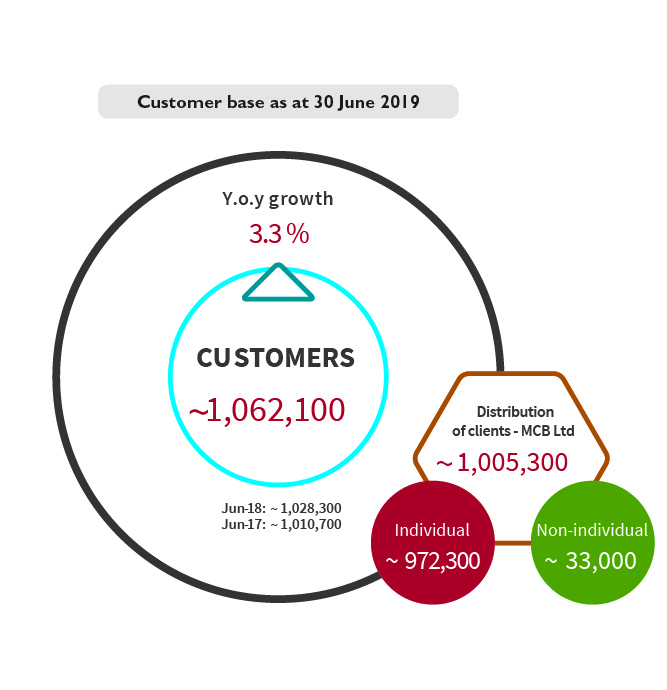
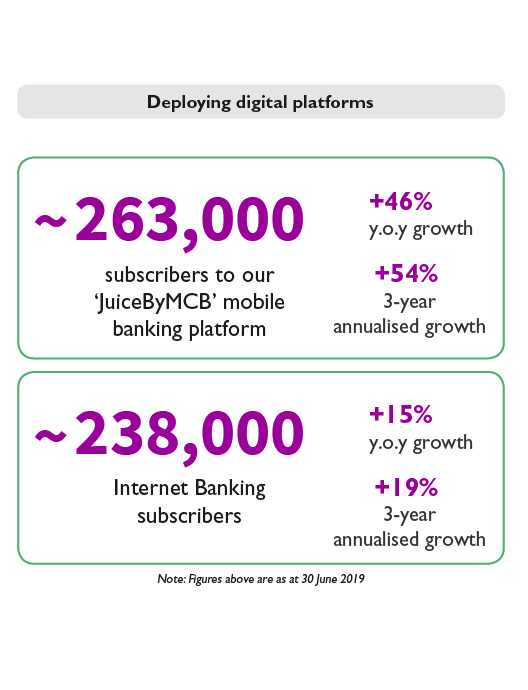
Organisation of and participation in key events
The Group is organising the 10th edition of its ‘Africa Forward Together’ seminar in October 2019. Of note, last year’s event welcomed 24 banks and financial institutions from 11 African countries. This annual seminar offered bankers a privileged platform to network with industry leaders as well as share experiences and views on trends and business developments shaping the financial services on the continent. MCB provided its African institutional partners with avenues for forging or strengthening business relationships and leveraging collaboration opportunities.
The organisation has, for the fifth consecutive year, been the Diamond Sponsor of the Africa CEO Forum, which was held in Kigali in March 2019. The Forum brought together some 700 Chief Executive Officers from around 70 countries and spanning a wide range of industries as well as over 100 Government officials and heads of development institutions. It serves as a platform for constructive dialogue to shape Africa’s future and identify business opportunities on the continent.
To stimulate creativity, generate innovative ideas and foster enhanced collaboration with local entrepreneurs and FinTech start-ups, MCB organised the second edition of its ‘InovApp Challenge’ in March 2019, in partnership with IBM, Oracle Cloud and the Mauritius Software Craftsmanship Community. In addition to a competition organised amongst staff, the event for the public involved 60 participants. The latter worked together in teams of three to five people, with the aim being to create an original and useful IT solution. The theme was "In view of making Mauritius a true Smart island, how would you support the local economy through digital?”
Societies and communities
- The Group has continued to foster the well-being and progress of the societies and communities in which we live and operate. In Mauritius and across other presence countries, we partnered with relevant stakeholders, such as NGOs and public sector entities, towards promoting societal well-being. We provided support in key focus areas, notably community empowerment and preservation of the natural environment, arts and culture, youth development and sports, as well as education. In respect of the latter, it can be noted that our organisation has, so far, awarded 31 scholarships to Mauritian students ranked next in line with those eligible for the State of Mauritius scholarships on the Economics side at the Higher School Certificate examinations, while 34 students from Rodrigues have been awarded scholarships under the MCB Rodrigues Scholarship, enabling them to pursue tertiary studies at the University of Mauritius.
- Our corporate social responsibility activities are channeled via the MCB Forward Foundation, which is the dedicated vehicle responsible for the efficient and effective design, implementation and management of initiatives meant to embed the Group’s engagement with the communities in which it operates. In FY 2018/19, consistent with the authorities’ requirement for companies to set up an annual CSR Fund representing 2% of their chargeable income derived during the preceding year, an aggregate amount of around Rs 109.3 million was accordingly earmarked by the Group’s local subsidiaries. In line with the Government policy that 50% of companies’ CSR contributions for projects initiated prier to January 2019 be channeled to the Mauritius Revenue Authority, Rs 54.7 million were entrusted to the MCB Forward Foundation and spent on 15 projects, of which 13 are ongoing. The entity remained actively engaged into dedicated projects for the promotion of social welfare and empowerment through multiple areas of intervention. During the last financial year, particular attention was given to the provision of decent dwelling to families of beneficiaries. For instance, 15 households under the MCB Football Academy benefited from renovated housing arrangements.
- It is worth highlighting that no political donations were made during the year under review.
- By means of our personalised solutions and thoughtful channel distribution, we promoted financial inclusion in Mauritius, thus enabling our low-income customers to get access to credit and improve their conditions. We helped individual clients achieve their ambitions, including buying a home/car or paying for personal expenses. With regard specifically to the tailored financial solutions of MCB Ltd: (i) the low minimum balance for account opening and the fact that our savings account bundle bears no cost make the offer extensively accessible; (ii) parents are invited to open Junior accounts to encourage our young generation to be financially responsible and save from a young age; and (iii) our unsecured personal loan offer, which is also available to non-MCB customers, is often sought by low-income customers to cover for education and housing purposes. Furthermore, we provided innovative and customised solutions to SMEs as well as micro-enterprises and self-employed individuals, thus benefiting business people and households.
- We made further inroads in preserving our cultural heritage, while promoting the dissemination of arts. We took the leading role in sponsoring and/or spearheading the materialisation of key projects aiming to promote local talents at various levels, including music, singing and dance, art and writing, photography, painting and sculpting, as well as theatre and performing arts. On another note, we encouraged the adoption of environmentfriendly and energy-saving practices in our operations and business activities. Since May 2012, MCB Ltd adopted the Equator Principles, which is a voluntary and internationally recognised risk management framework, espoused by many financial institutions worldwide, for determining, appraising and managing environmental and social risks in project financing. This framework stands as the foundation and guiding principle of the Bank’s Environmental and Social Policy, which articulates the principles, policies, roles and responsibilities through which the Bank ensures the environmental and social risks management of its lending activities, in particular regarding any project or undertaking entailing loans of an aggregate amount greater than or equal to USD 2 million and with maturity of at least 24 months. As a key strategic thrust, the Bank continued to monitor and assess its direct environment footprint in order to minimise the impact of its activities on the environment. The Bank remained committed to raising awareness amongst its employees and external stakeholders, while engaging with them to stimulate the adoption of sustainable habits and work towards environmental protection. We worked towards effectively managing our direct carbon footprint, driving eco-efficiency performance and greening the supply chain. For instance, the Bank seeks to ensure that all suppliers comply with sustainable procurement standards. Also, it actively promotes the use of e-statements by customers. The total number of customers subscribing thereto increased by nearly 6% during the year ended June 2019. In the same vein, in order to reduce the environmental impact of our activities and operations on the society and community, an electronic communication campaign was launched in July 2019 to encourage shareholders and bondholders to receive the soft copy of our Annual Report by email instead of the hard copy usually sent to them. A positive response was received from shareholders. Moreover, we encouraged environment-friendly and energy-saving investments, as it can particularly be gauged by the provision of the third edition of our preferential credit facilities termed as ‘Green loans’ (see pages 63 and 72 for more details).
Authorities and economic agents
- We assisted our presence countries in their endeavours to promote the development and modernisation of their respective economic sectors and financial jurisdictions. In Mauritius, alongside financing key projects shaping the economic landscape, the Bank helped to foster the sustained growth of the country’s businesses. We have remained a dedicated and trusted partner for large corporates and investors, while upholding our commitment to accompany small and medium enterprises across a broad range of economic sectors by means of our tailored and modular solutions. Furthermore, the Bank helped to position the Mauritian jurisdiction as an International Financial Centre of substance and good repute, backed by support provided to businesses transiting through our country to conduct business across the African continent.
Helping the economies where we are involved to prosper
Direct contribution of MCB Ltd to the Mauritian economy (FY 2018/19)
Contribution to value added
~ 4%
~ 55%
Creating jobs on the nationwide scale
~ 20%
~35%
Paying taxes in support of Government revenue mobilisation
~10%
Notes:
(a) Total corporate tax paid Includes levies charged on income
(b) It excludes our indirect contribution induced by tax paid by our suppliers
~50%
Direct contribution of MCB Seychelles to the Seychellois economy (year 2018)
~1.5%
~25%
~11%
Note:
Figures displayed above are indicative, based on officially-reported data and MCB staff estimates. Furthermore, they depict the direct contribution of the entities to their respective economies, after leveraging official methodologies and advocated international norms. As such, they do not make allowance for the indirect impact of their operations and banking activities. In our Sustainability Report, an analysis of the latter impact at the level of MCB Ltd has been carried out by our international consultant, namely Utopies. As per estimates by the latter, the overall direct and indirect contribution of MCB Ltd to the country’s GDP amounted to 17% during the year 2018.
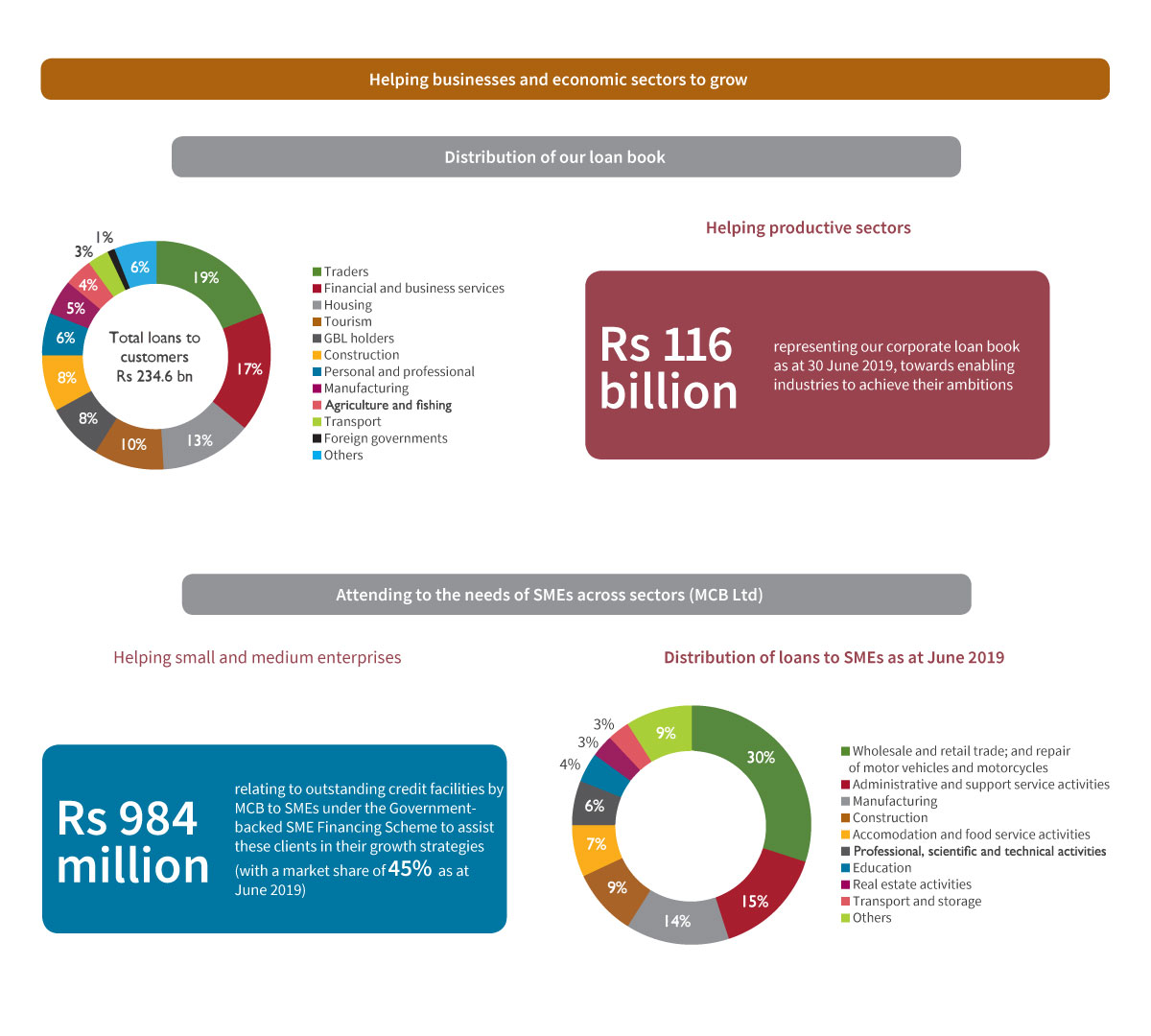
- We safeguarded the perennity and soundness of our operations, alongside fully coping with specificities and implications of evolving mandatory provisions and requirements. We ensured strict compliance with relevant regulatory limits and guidelines relating notably to business operations, product development, market development and risk management in the jurisdictions within which we operate. We assisted in strengthening the regulatory framework on the basis of our close collaboration with the regulators. We attended to regulatory reviews with notable attention to detail and professionalism, while promptly reacting to matters raised. We submitted reports in a timely manner to regulatory bodies, while transparent relationships were forged to promote adequate monitoring of our activities and informed discussions about relevant issues.
Employees
- As key endeavours during the last financial year towards embedding our position as an employer of choice, we pursued our efforts to attract, develop and retain talents as well as empower them to deliver their best, alongside further developing and leveraging the collective skills, knowledge and experience of our staff. Concomitantly, the Group engaged with staff at different levels to adequately understand and respond to their needs. On a more holistic note and as a major undertaking for the period, the Group has pursued the implementation of its HR Transformation Programme (see page 66). The aim is to reinforce human resource frameworks and processes, in support of enhanced performance deliveries and business growth.
- The subject matters to which the Group is exposed to are getting more complex and client solutions increasingly sophisticated. Against this backdrop and backed by a forward-looking approach, we remained intent on bringing about relevant upgrades to our learning framework and culture. Overall, dedicated programmes to step up the quality of our human capital include the conduct of training courses and lectures held by international experts at our Learning and Development Centre. Employees benefit from technical training as well as courses meant to develop soft skills, either delivered in-class or on-line. Worth noting, our range of courses has lately been enriched with those provided by the MCB Institute of Finance.
- Capitalising on its fair and robust remuneration philosophy, the Group strived to reward its employees adequately, in line with market conditions and meritocracy principles. Also, the Group provides a range of fringe benefits to its employees to help them in their personal life. In addition to that, our employee share option scheme (see page 108) provides eligible employees with the opportunity to partake in the growth and prosperity of the Group, through acquisition of its shares.
- The Group continued to work towards entrenching a balanced and diversified workforce in terms of gender, age group and experience in order to tap into a wide range of knowledge, skills and specialist competencies in view of creating the right conditions to achieve business strategies. In addition, the Group maintained a stimulating work context by fostering secured and healthy environments. While being compliant to legal and regulatory requirements, the Occupational Safety and Health Policy of MCB Ltd aims to foster a sound working environment and system of work for the benefit of its employees, as far as it is reasonable. Moreover, the Bank further deployed programmes to uphold the overall well-being of its employees. In addition to dedicated wellness initiatives, the Bank further implemented its Flexible Working Arrangement (FWA) initiative to support its staff. Lately, this was enriched with the ‘Work from Home’ arrangement, initiated on a pilot basis. The arrangement aims to help employees maintain a healthy work-life balance, while working from the comfort of their home and avoiding undue time to be spent in the traffic.
General stability of our workforce as at 30 June 2019
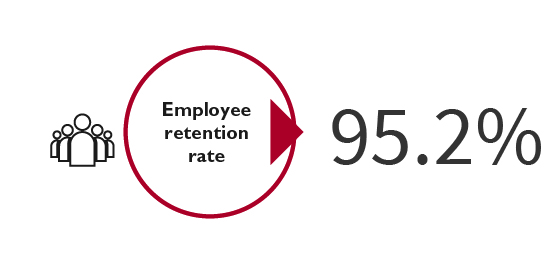
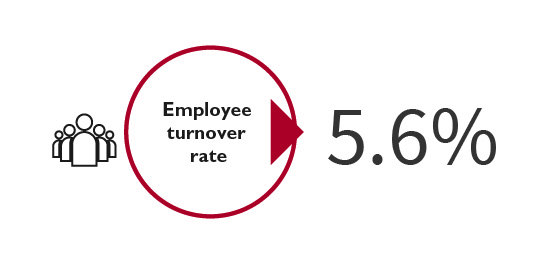
Notes:
(i) Retention rate is the ratio of the number of employees that stayed during a specific period to the number of employees at the beginning of the period
(ii) Turnover rate is the ratio of the number of employees that left to the average number of employees during a specific time period
Our performance across entities
Banking cluster
MCB Ltd
Financial performance
In spite of the challenging operating context prevailing in Mauritius and abroad, the Bank recorded a solid financial performance. Net profit for the year increased by nearly 30%, with the Bank’s contribution to Group results amounting to Rs 8,338 million. This outcome was underpinned by a rise of 21.2% in net interest income, which was essentially linked to the solid expansion of our loan book, notably attributable to our international activities. Non-interest income rose by 14.7% on the back principally of the continued rise in net fee and commission income, whereas ‘other income’ increased by 23.6% mainly driven by the significant fair value gains on equity instruments now included in the ‘statement of profit or loss’ following the adoption of IFRS 9. However, a subdued performance was recorded in respect of profit on exchange, reflecting unfavourable market conditions. Our cost to income ratio declined by 3.3 percentage points to attain 33.7%, in spite of operating expenses edging up by 8.6% on the back of initiatives to strengthen our human resource and digital capabilities.
Our business development
The financial performance of the Bank was supported by sustained and thoughtful efforts to execute its business expansion agenda. The Bank delivered on its strategic focus areas by strengthening its leading banking position on the local scene and pursuing its regional diversification endeavours across key growth pillars. At the same time, the Bank continued to mobilise the necessary resources to build sustainable capabilities for growth, with guiding considerations being customer focus, an engaged and agile workforce, seamless operations, an innovative culture as well as a robust risk and compliance framework. On the operational front, the Bank pursued business transformation and realignment initiatives with notable organisation-wide ramifications, aimed at supporting strategic endeavours and laying foundations for the future.
As another underpinning of its growth ambitions, the Bank successfully signed and closed a general syndication for a USD 800 million Dual Tranche Syndicated Term Loan Facility, obtained from a consortium of banks spanning Europe, Middle East and Asia. The objective is to help the Bank execute on its African ambitions, while further optimising and diversifying its funding profile.
Looking ahead, while coping with the demanding operating landscape and adopting a disciplined approach, the Bank will resolutely move forward to uphold its balanced business growth and key financial soundness metrics. Essentially, it will pursue the execution of its three-pronged strategic objectives, namely to extend its frontiers, deliver a world-class customer experience through digital, and nurture its values and deliver on its brand promise. While being currently well embarked on multiple initiatives towards building the bank of the future, we will further bolster our ability to tap into growth opportunities surfacing locally and in the region.
Delivering on our growth pillars
- MCB continued to adopt a disciplined and customer-centric approach to assist businesses and investors. It capitalised on (i) its unique selling propositions and tailored products and services; (ii) the reinforcement of staff capacity as well as the consolidation of tools and processes in support of improved operational excellence and risk management; (iii) the development of closer relationships across market segments; (iv) the optimisation of organisational synergies and promotion of a cross-selling culture across the Group. Reflecting our engagement, our market share in respect of domestic credit to corporates stood at around 42% as at 30 June 2019, consolidating our status as the premier business partner of companies.
- During the last financial year, we contributed to the materialisation of key projects reshaping the landscape of Mauritius. We expanded our exposures vis-à-vis customers operating across key economic sectors, particularly tourism, property development, construction, and financial and business services. We accompanied corporate and institutional clients in their growth endeavours, capacity building moves and restructuring initiatives, while acting as a trusted business advisor. Along the way, the Bank remained actively involved in the provision of ‘Green loans’, pursuant to the lending facility availed from Agence Française de Développement (AFD), in the context of the latter’s green finance label titled SUNREF (Sustainable Use of Natural Resources and Energy Finance). The key objective of the facility is to stimulate the deployment of renewable energy and energy-efficient technologies, save energy and reduce carbon emissions. In September 2018, following the success of the first two lines of credit in respect of which it had remained the most active drawer, the Bank renewed its partnership with AFD as a participating bank for the 3rd phase of the SUNREF programme in Mauritius. This new line consisted of a financial package of EUR 75 million. Our ‘Green Loans’ have been offered to a wide range of individual, SME and corporate clients in Mauritius, while we also attended to the needs of customers in some foreign presence countries. On another note, we delivered a broadening range of adapted treasury structured solutions to meet the evolving needs of our clients, alongside further disseminating our electronic forex platform, i.e. MCB Wave, which our treasurers leverage as an all-in-one digital and day-to-day tool to manage trading requirements. It is also worth highlighting that, as an authorised MUR fixed income Primary Dealer appointed by the Bank of Mauritius, the Bank was actively trading on the primary and secondary markets.
- We made further inroads in attending to the needs of companies leveraging Mauritius as an International Financial Centre (IFC) of repute and substance. In the wake of the testing operating landscape facing its customers, the Bank has maintained its thoughtful business growth agenda and broadened its involvement vis-à-vis global business entities, trusts and foundations after capitalising into the positioning of Mauritius as a gateway for conducting business with other regions. Our market development initiatives were underpinned by the delivery of adapted solutions and enhanced client interactions.
- Backed by a thorough understanding of client requirements, the Bank has cemented its positioning as the foremost service provider for SMEs in Mauritius, alongside continuously enriching its value proposition. In this respect, the organisation has, in the wake of its Digital Transformation Programme, launched a digital platform to simplify the end-to-end journey for SME Account Opening and materially improve the customer experience (see page 71). Moreover, we strengthened the SME ecosystem with the launch of the MCB Business Introducer Program in line with our engagement to empower entrepreneurs. It is a platform whereby we facilitate direct interactions of SMEs with local Accounting firms with a view to forging new business relationships. Based on their expertise, these firms help SMEs structure their business and uplift internal processes, towards better managing their day-to-day accounting needs. In the same vein and reflecting its commitment to promote responsible banking, while providing its clients of an ecosystem of services, the Bank has, in the context of its ‘Lokal is Beautiful’ proposition, introduced a dedicated scheme aimed at improving access to finance to Mauritian entrepreneurs who can demonstrate the positive impact that their activities can yield on the welfare of the society and nation (see page 72).

Patrick Beauduin
Well-known speaker, Patrick Beauduin, hosted a conference for our SME customers in July. He analysed the impacts of digital evolution on the ways in which brands communicate to their customers.
- During FY 2018/19, MCB has remained exposed to heightened competitive pressures across several segments. Yet, the Bank pursued its strategic intents and maintained its prominent market positioning across age and income groups. Alongside reflecting our strong brand, such headway was underpinned by our sound business development trajectories, strengthened operational capabilities, innovative technologies, active on-the-field presence, and continuously refined value proposition. As a key focus area, the Bank stepped up its efforts to upgrade and promote its digital channels vis-à-vis its client base. We have remained active on the payments scene by allowing clients to make and accept payments in a quick and hassle-free way via multiple channels (see page 68).
- Within the mass and mass affluent segments, in addition to strengthening our prominent footprint in respect of education loans, we have, as a key achievement, consolidated our leadership market position in mortgage. Our market share for housing loans stood at around 37% as at end-June 2019, on the back of a growth of nearly 11% in our loan book. Alongside leveraging digital channels and simplifying the end-to-end customer journey for obtaining or refinancing a housing loan (see page 71), MCB refined the appeal of its mortgage solution, which has been further customised to meet different client needs. Overall, the Bank continued to adapt and promote its tailored offerings, with a case in point being the ‘Neo Bundle’, which aims at giving customers an enriched experience through a package of products and services. Moreover, we further endeavoured to encourage our customers to save and invest. Alongside distributing the Group offerings (including notably investment solutions), we have redesigned our ‘Rupys’ savings account, which is dedicated to clients under 18 years old.
- The Bank made further progress towards meeting its objective of acting as the trusted lifetime partner for its affluent and high net worth customer base in Mauritius. Towards this end, it capitalised on its differentiating service quality and bespoke offerings, notably relating to its increasingly sophisticated range of investment and wealth management solutions. As a key offering, our customers continued to take advantage of our Lombard loan, which enables them to utilise a wide spectrum of credit products, which are secured against their existing investment portfolios. To underpin our strategic thrusts, we tapped into strengthened customer interactions and enriched offerings. Specifically, our value proposition was, during the last financial year, enhanced with the introduction of (i) a premium flexible housing loan offer, which allows for adequate flexibility for the facility repayment and contains differentiating features, including an interest rate which is aligned with the project value, the required financing and credit assessment amongst others; and (ii) a 31-Day Notice Account, which is an interest-bearing USD /EUR deposit account offering a convenient and flexible solution to customers.
- While maintaining a disciplined approach, the Bank made further progress in extending its frontiers abroad. Alongside embracing an opportunistic stance to diversify its market positioning and tap into interesting opportunities, the Bank has remained mainly involved in niche areas where it displays strategic competencies. Consequently, we have continued to deepen our relationships with existing clients and selectively extended our customer base across segments and geographies. Overall, by upholding and reinforcing the growth momentum of its businesses as well as nurturing a wide range of business partnerships, the Bank has positioned itself as a dependable and competitive banking player in Africa. To underpin its market development initiatives, the Bank has capitalised on its customised solutions, regularly-updated risk appetite, a network of some 1,150 correspondent banks worldwide (including around 200 in Africa), Representative Offices as well as the Group’s foreign presence via its subsidiaries and associates. Of note, the Bank has opened a Representative Office in the Dubai International Finance Centre in July 2019, which marks another milestone with regard to MCB’s strategy for extending its frontiers and further diversifying its revenue streams.
- We have further broadened and diversified our portfolio of international structured finance, with the Bank financing major development projects across various economic sectors (mainly power, transport, telecommunications, manufacturing and hospitality), countries and products on the African continent, while being also increasingly involved beyond. We strengthened our rapport with existing clients and built on new relationship, alongside developing key relationships with top corporates and private equity Funds in Africa. Towards these ends, we remained actively involved in delivering a comprehensive suite of adapted financing, including project financing, acquisition financing and corporate lending, while offering our products and services via bilateral lending, club deals or syndicated facilities in order to suit the specific requirements of our clients.
- We reinforced our involvement in Energy and Commodities (E&C) financing, backed by our tailored value proposition, a robust risk appetite framework, as well as strong front-to-back internal processes, with specialised and dedicated resources being recruited in a transaction management and structuring capacity. We consolidated our positioning in key markets, alongside capturing opportunistic flows in other countries, supported by the deepening of relationships with a broad range of clients. Whilst moving towards mid-sized and big traders, we consolidated the trade finance segment of our portfolio. Beyond this sphere, we prudently diversified into the African oil and gas structured debt market. We made significant progress in shifting towards medium to longer-term financing along the value chain by widening our involvement across the upstream business, alongside playing a pivotal role in securing the petroleum products requirements of some countries in Africa.
- The Bank has, in close connection with the Group, remained an active promoter of the ‘Bank of Banks’ initiative, which consists of providing a palette of adapted solutions to financial institution counterparts, notably those operating in Africa. The Group partnered with and assisted some 91 financial institutions worldwide, including over 60 in Africa and spanning 24 countries in FY 2018/19. We enabled clients to gain access to state-ofthe-art services offered by various entities, thus helping them to underpin capacity building and business growth initiatives, while accessing industry best practices.
- MCB took dedicated initiatives in view of positioning itself as a reference in the region for premium banking and wealth management expertise, in line with a key growth pillar, which is to expand private banking into Africa and beyond. In spite of being confronted by a challenging operating environment amidst unsteady financial market conditions, total assets under management increased, while our international clients edged up, with major inroads made being across Europe and Middle East. This performance was backed by our sophisticated value proposition as well as active brand and relationship-building exercises. On the marketplace, we have reinforced our status as a trusted lifetime partner vis-à-vis our client base by delivering bespoke solutions, notably those that are geared towards the safeguard, growth and transmission of customer assets. In addition, MCB set out to further position itself as a unique point of contact for serving External Asset Managers, Multifamily Offices and independent financial advisors, while offering a suite of differentiated investment and banking solutions, from transactional to multi-asset class trading.
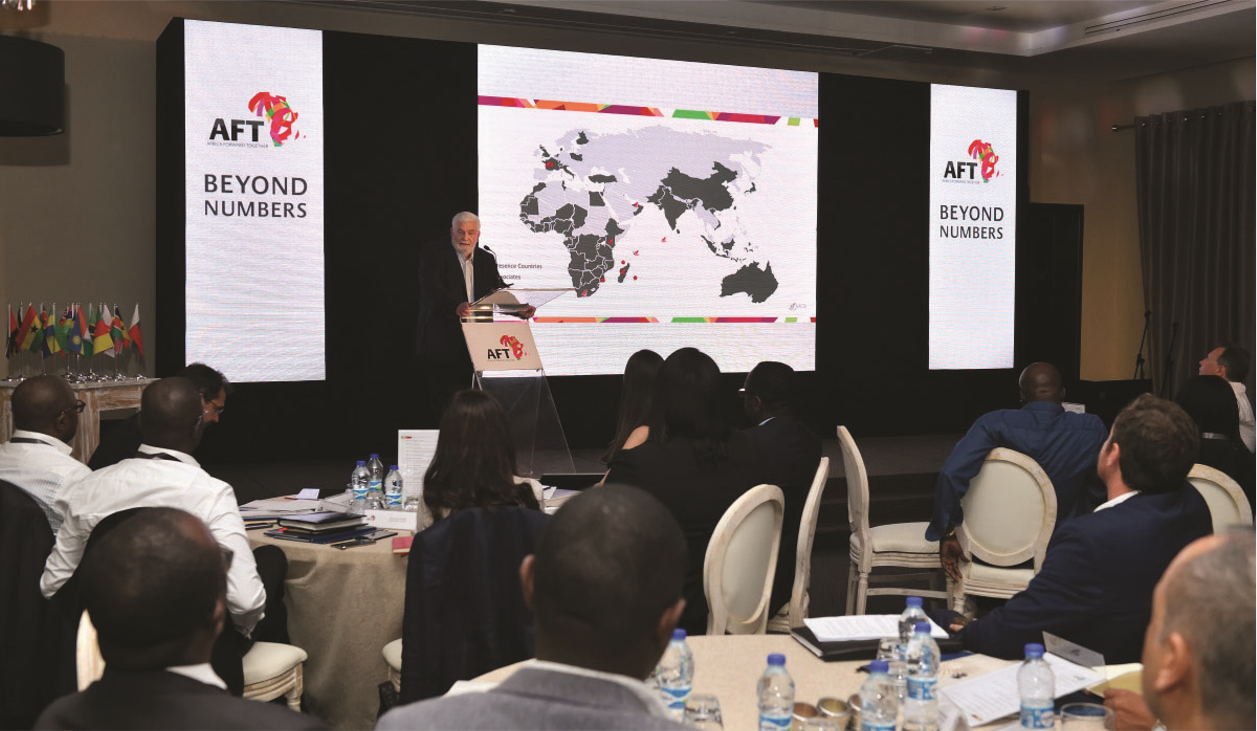
Africa Forward Together seminar
Our Africa Forward Together seminar, bringing together C-Suite delegates and decision-makers from Africa and beyond.
Key projects underpinning our business growth agenda
HR Transformation Programme
- The organisation boarded onto this programme to gear up the quality of its human capital in order to better support its growth strategies. It aims to implement world-class practices and processes to attract, develop and support employees who are engaged in their work and are motivated to perform at their full potential. Key objectives are to (i) implement a transparent talent management framework, while growing and retaining the best talents; (ii) create a set of leadership values and develop an attractive employer brand; (iii) refine the performance management framework to foster an environment of trust, high aspiration and high achievement; (iv) foster strategic talent acquisition by determining the right moves for identifying, attracting and hiring top talent; and (v) boost operational efficiency levels via upgraded systems, processes and practices.
- Towards crafting the transformation programme, we retained the services of a world-renowned HR consulting practice. Till date, major milestones have been realised following the elaboration – through a consultative process involving key stakeholders – of a new operating model and structure for the Bank’s HR function. A strengthened Talent Management Framework has been developed to meet strategic challenges faced by the organisation, backed by enhanced partnering of the HR function with business lines and entities in support of value creation. Further headway is being realised in terms of Leadership development, underpinned by the formulation of our Leadership Brand statement and Leadership Competency Framework. Alongside ensuring that all employees are treated in a fair and equitable manner, our performance management system is being reviewed, with emphasis laid on the business context, organisation culture and integration with other human resource systems/frameworks.
Private Banking and Wealth Management Transformation Programme
- To bolster operational efficiencies and better support its growth ambitions, MCB is currently engaged in an ambitious programme aimed at reinforcing the strategic positioning of its Private Banking and Wealth Management function. Key objectives are to (i) redefine our value proposition; (ii) optimise our operating model, while bolstering inherent capabilities and building scalability; and (iii) set the foundations for the right international business culture. The Bank aspires to capture attractive business opportunities, whilst enriching the experience for its customers, employees and other stakeholders.
- To ensure feasibility and foster ownership of recommendations proposed by our international consultant, employees have been closely involved at each stage. An in-depth current state assessment has been carried out in comparison with best practices. Up to now, a new operating model and organisation chart has been approved for the Private Banking and Wealth Management function. This would notably underpin the execution of key initiatives, including the formulation of a refined client segmentation model and the crafting of business development plans towards increasing share of wallet in the local market and furthering expansion in Africa and beyond.
Treasury Realignment Programme
- Key objectives of the project are to define a medium-term strategic vision and roadmap to establish a best-in-class Treasury function at the Bank, while (i) reinforcing asset-liability management; (ii) enabling organic growth through improved Bank-wide offerings; and (iii) tapping into avenues linked to the positioning of Mauritius as an IFC and prospects across Africa.
- So far, the Bank has elaborated a new operating model for its Treasury function. It is currently in the process of finalising the formulation of an action plan for the identification of key talents and responsibilities to fulfill set mandates as well as the implementation of a change management plan amongst others.
- During the last financial year, the Bank has remained committed to embedding operational excellence and innovation as a key enabler of enriched customer service quality and relationships. The Bank further broadened its digital footprint and continued to unleash dedicated initiatives to accelerate the migration of customers from branches to digital channels. This contributed to further enhance the speed and flexibility with which we deliver value to customers. Specific moves have been pursued to ensure that customer needs are fulfilled in a fast, accurate and simple manner.
Pursuing our Digital Transformation Programme
- MCB has been engaged in building human and technological capabilities to execute an ambitious roadmap of initiatives that would cater for the full-fledged execution of its Digital Transformation Programme. Alongside achieving more agile and productive operations and strengthening the Bank’s competitive edge, a key ambition of MCB is to deliver a more convenient and appealing experience to clients, insofar they are, themselves, becoming increasingly ‘digital’ in their behaviours. The success of our Digital Transformation programme was highlighted by a survey by McKinsey. It showed that MCB’s Digital Quotient – which is a measure of our digital maturity across the areas of strategy, culture, organisation and capabilities – improved by 30% over the year to attain a score of 43 in April 2019, which is significantly above the banking peer average score of 34.
- During the last financial year, we reinforced the operationalisation of our Digital Factory to spearhead our digital transformation. The Digital Factory is anchored on a culture of start-up, while favouring a co-creation paradigm and fully engaging the employees of the organisation. It is integral of our objective to becoming an agile organisation and fostering the next phase of our growth journey. It serves as an incubator for embedding truly customer-centric operations across the Bank by redefining and digitizing end-to-end customer journeys, backed essentially by business process reviews and reengineering.
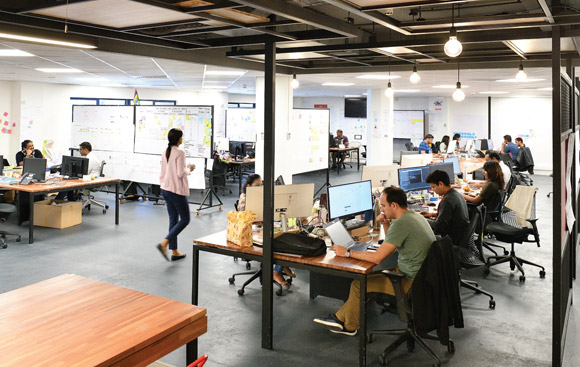
Digital Factory
MCB aims to deliver world-class experiences to its customers, through its Digital Factory.
Enriching our payments value proposition
- We have actively pursued our journey towards promoting digital payments solutions with a view to positioning ourselves for the advent of a cashlite economy, while enabling our clients to undertake their transactions in a smart, simple and convenient manner. After making allowance for the evolving lifestyles and behaviours of customers and the gradual development of a full-fledged national payments infrastructure, MCB continues to gear up to tap into the continued expansion in the scale of digital payments across markets in which it operates, backed by sustained investments in innovative platforms and solutions.
- As at end-June 2019, our ‘JuiceByMCB’ mobile banking service boasted around 261,000 subscribers, of which some 81,000 recorded during the past year, thus strengthening MCB’s local leadership position in this segment. It is worth highlighting that we have, during the last financial year, further upgraded the user-friendliness and convenience of this service, with new features having been delivered based on customer feedback (e.g. Quick Scan, personalisation of home page, etc.). As for Internet Banking, total subscribers registered a year-on-year growth rate of 14% to attain around 220,000 as at June 2019.

Juice, tro fasil!
JuiceByMCB was launched in Seychelles in October 2018.
- Our regular card usage campaigns, coupled with sustained customer education, have helped to successfully boost transactions at merchant Point of Sale (POS) terminals. As a key source of satisfaction, we further disseminated our contactless payments solutions – which offer the opportunity for our customers to use their MasterCard Debit Chip card at any MasterCard contactless-enabled merchant point of sale device worldwide – with the Bank witnessing a sustained rise in the number of transactions undertaken via such channels. MCB has also pioneered the introduction of contactless payments as well as Alternative Payments Methods (APM) via its ‘JuiceByMCB’ QR code. While both solutions are at their inception phase, they should be key enablers to convert lower value cash transactions into digital payments in the periods ahead.
- On the acceptance side, MCB has been continuously providing value added services to the merchant community. We rolled out till integration projects at major retailers, which helped to improve the processing time at check-out and enable self-service tills, alongside easing the end-ofday reconciliation, thus making it altogether a better experience for the end consumer and merchant. We are also a key stakeholder in enabling merchants to accept online payments, thus allowing them to expand their reach and increase their sales. Moreover, the Bank’s Cards SBU, in close collaboration with other entities of the Group – namely International Cards Processing Services and MCB Consulting Services – enabled several African banks to connect to international networks such as MasterCard, Visa and UPI, alongside accompanying those banks amidst their objective to set up a profitable Cards unit.
Upgrading our information technology platform, while keeping customers’ satisfaction and safety at the centre of our operations
- The Bank availed of cutting-edge technologies across the value chain, alongside continuously upgrading its IT systems and infrastructure in order to further enhance operational efficiency levels and eventually boost customer service quality.
- As a key achievement, the Bank implemented its new Treasury system during the last Financial Year. Thus, it now runs a state-of-the-art platform, aimed at improving avenues for undertaking a broader range of activities on the system and fostering improved coordination of information across the value chain, while bringing new and sophisticated treasury products on the market. In addition, MCB is gradually implementing a new Portfolio Management Platform to improve the capabilities of its Private Banking and Wealth Management business line. It has also embarked on a project geared towards the cloudification of its platforms, as evidenced by the successful migration of its Enterprise Resource Planning (ERP) and the upcoming Human Resource Management System (HRMS). MCB is now using a complete and secure Cloud Platform, encompassing the latest General Ledger, Accounts Payable, Procurement and Fixed Assets modules. This makes us the pioneer and largest organisation in sub-Saharan Africa to implement such a platform on the Cloud.
• Reflecting the strong credentials of its main Data Centres, the Bank is progressing towards achieving Tier 3 certification, while the Disaster Recovery site is already a Tier 4 certified Data Centre. Our SWIFT Service Bureau was one of the first in the region to be SWIFT 2019 certified and we are aiming for the latest PCI DSS certification for our Cards services, while a comprehensive ISO 27001 compliance programme has been initiated for our IT Operations.
• The Bank is progressing well on its digital transformation, with a revised IT Architecture Roadmap defined to support our digital agility. An Omnichannel platform is being implemented on a pilot project, before being rolled out across all channels. A new Workflow platform (BPMN 2.0 compliant) was selected, with several flows already migrated to the platform. A newly integration layer was introduced, to facilitate the integration between our channels and our Core Services layer, via APIs. It will be further enhanced to enable Open Banking integration. Robotic Process Automation is also high on the agenda, with several automated flows already live, significantly improving the efficiency and resilience on some of our critical back office activities.
- The Bank remained actively engaged in disseminating its core values across different layers of the organisation to foster an alignment of actions being deployed to achieve common goals. It strived to ensure that such values are continuously lived up and transposed into the day-to-day attitudes, behaviours and activities of its employees.
- As highlighted before, the organisation is executing an ambitious Corporate Sustainability Programme (CSP), with the key pillars being as follows: (i) the development of a vibrant and sustainable local economy, (ii) the protection and valorisation of our cultural and environmental heritage and (iii) the promotion of individual and collective well-being. Several initiatives have been taken under each pillar as part of our efforts to drive sustainability as a core feature of our way of doing business and make a difference in the societies and communities in which we live and operate. To underpin efficient project execution and management, an integrated governance and operational set-up has been put into place. It is led by a Programme Steering Committee, which is chaired by the Deputy Chief Executive of the Bank as the Executive Sponsor. Each of the three pillars of the programme were put under the responsibility of two ‘pillar owners’, as ambassadors for the project. They rallied people to join the programme and these volunteers were grouped into workstreams under each of the key themes considered.
- As the situation stands, to reinforce its inherent capabilities, the organisation is in the process of setting up a Sustainability Team, which is mandated to bring forward and monitor the implementation of the Corporate Sustainability Programme, while fostering a more effective integration of sustainability topics in our operations. In addition to that, the governance framework overseeing the programme is being upgraded in order to ensure seamless communication amongst stakeholders and a smoother process flow with regard to the rolling out of earmarked initiatives. This capacity building momentum will support the realisation of earmarked future initiatives under each pillar to pursue our sustainability agenda. In this respect, a clear roadmap delineating deadlines and quantitative targets for measuring progress has been elaborated. The organisation is also gearing up to formulate a longer-term strategy that will holistically and coherently shape up its sustainability engagement.
Key objectives pursued






Our Digital Factory
General overview
- Key tasks include the end-to-end definition, redesign and digitisation of customer journeys, starting with an initial minimum viable digital product (MVP) over a fixed period
- Championing in an agile way of working
- Strong customer-centric approach through co-creation
- Collaboration
- Continuous improvement and short feedback loop
- Fail fast culture
- Continuous learning culture
- Innovation culture through participation in events, competitions and conferences
- Self-organised team
- Team v/s individual performance – if the team fails, even if you are a high performer, you fail as well.
- Make work FUN – in order to build a loyal, high performing, engaged workforce, we strive to inject fun into the workplace.
Human capital
- Local and international teams, with eight different nationalities and broad mix of skills competencies
- Continuous investments in skills development; recruitment of new talents to fill in several key roles, from data analytics and user experience design to user interface design and full stack developers to create design practices
Structure and mechanisms
- Adoption of a Scrumban hybrid for our primary delivery method – our cross-functional and co-located squads are small groups of 10-12 people working closely together and emanating from various segments of the Bank. They have the necessary skills to ideate on a product and deliver that finished product to the market. The squads include Product Owners, Scrum Masters, Designers, IT engineers, Business Analysts and may be supplemented by subject matter experts
- Integration of the overall MCB community, while facilitating a culture shift at work; staff consulted and integrated into designing solutions and fully supported on the changes
- Adoption of cutting-edge information tools such as omnichannel and workflow tools
- Establishment of Advanced Analytics practice to (i) address business-related use cases and problem statements; (ii) disseminate and sharing knowledge on best practices in the field across the organisation; (iii) collaborate with relevant stakeholders to set-up the long-term vision for data collection, hosting and processing; and (iv) foster the use of sophisticated data mining and analysis as well as modelling techniques to better understand customer behaviour towards providing actionable insights to business units
- Setting up of a Data Office to help MCB leverage data as strategic asset, while contributing to improve the quality and accessibility of the data infrastructure
- Setting up of a Customer Lab to bridge the gap between the organisation and people (i.e. the customers and employees) – through Design Thinking, the lab is acting a beacon for the organisation by contributing research, encouraging co-creation with customers and seeking innovative solutions
- Setting up of Change Management Office (CMO) to drive the adoption of new customer journeys across the organisation – the unit (i) provides the structure to effectively implement the changes required to successfully deliver the new journeys; (ii) anticipates, assesses and caters for the impact of changes on resources; and (iii) provides colleagues with the tools and training needed to implement the changes
Main accomplishments
- Headway made towards implementing an agile way of working across MCB as a whole to trigger a fast-moving organisation, while seeking to generate higher team productivity and morale, faster time to market and better service quality
- Launch, so far, of two digital platforms under our Mortgage Customer Journey and SME Account Opening Customer Journey – customers applying for housing loans through the online platform, which is effected within 10 minutes, can now benefit from new features such as an ‘Approval in Principle’ within 48 hours and a relatively faster housing loan disbursement, while new SME customers are able to open their business accounts within 2 working days. This has contributed to reduce the number of branch visits for our customers and ensured that clients enjoy a simple and transparent application journey. In fact, since October last year, our Mortgage digital on-boarding platform has processed more than 350 applications, with the figure for the SME platform standing at some 950
- Other achievements

Analytical models
developed by Analytics Squad

Data domains launched
by Data Office

Customers Interviews
Tests conducted

Innovations implemented
(Angular/Java, OpenShift, Workflow Tech – Camunda, DevOps – CI/CD pipeline, Feature Approval In-Principle…)

Colleagues* trained
on Agile Methodology (*outside of Digital Factory)

Colleagues trained
on new processes in all branches
Selected initiatives executed across the Corporate Sustainability Programme
‘Lokal is Beautiful’ report
- Titled ‘Lokal is Beautiful’ and prepared by a renowned French consulting firm, i.e. Utopies, the organisation has released, for the attention of key stakeholders and the general public, the results of a full-fledged study that was commissioned with a view to identifying and appraising economic leaks in Mauritius. The study aimed at uncovering how the country’s prosperity could be uplifted by enhancing the multiplier effect within the economy by means of dedicated policies and initiatives. The initiative seeks to engage stakeholders in collaborating with the Bank to discuss about pertinent options to reshape the country’s economic model, while embracing a more vibrant, entrepreneur-driven and sustainable mindset.
![]() More information on our ‘Lokal is Beautiful’ section
More information on our ‘Lokal is Beautiful’ section
Strengthening the SME ecosystem
- As its brand new offer to SMEs and a meaningful move, the Bank launched its ‘Lokal is Beautiful’ scheme. Alongside consolidating our market share, the scheme aims to improve access to finance for responsible Mauritian entrepreneurs. The clients that are on-boarded as part of this scheme are subject to specific eligibility criteria (notably relating to types of business being involved into as well as compliance to environmental, social and governance standards). They can benefit from appealing solutions and an ecosystem of services (e.g. up to 100% financing, low interest rate, flexible disbursement and repayment plan, rapid application process via digital channels, partnerships with key business stakeholders, participation in networking events such as Business Meetings, availing of the MCB Business Introducer Program) that meet their requirements.
- While embedding a network that provides SMEs with effective means to realise their ambitions, the ‘Lokal is Beautiful’ scheme seeks to promote the adoption of sustainability principles by the society, alongside underpinning the country’s progress at large.
VIBE Moris®
- The second season of VIBE Moris® – a song competition which has been imagined, designed and produced by MCB Group in collaboration with key partners – was broadcast on the national television in May last. Key objectives are to encourage the development of stage-related jobs, demonstrate that there is scope for the emergence of a cultural industry and provide a platform for artists to develop their talents.
‘Green loans’ to clients
- The Bank has maintained its commitment to promote green financing and inclusive growth through its flagship ‘Green Loans’ offering, pursuant to the lending facility availed from Agence Française de Développement (AFD). This collaboration has enabled MCB to finance clients’ positive environmental impact projects, while focusing on stimulating the deployment of renewable energy and energy-efficient technologies and reducing carbon emissions. Of note, the third edition of the facility availed from AFD is even more ambitious than the previous two lines. In addition to supporting mitigation of climate change projects (i.e. covering renewable energy, energy efficiency, reduction in greenhouse gas emissions), the new programme intends to finance adaptation to climate change projects as well as projects promoting gender equality.
‘Social leave’ for employees
- The organisation has launched its ‘Social Leave’ initiative. A 1-day paid leave is granted to all MCB employees on a yearly basis for participation in volunteering activities. The aim is to provide employees with the opportunity, by means of a dedicated framework, to be actively engaged in the community and yield a long-term impact on projects where our staff are involved.
Foreign banking subsidiaries
MCB Madagascar
- In FY 2018/19, MCB Madagascar posted a remarkable growth of more than 60% in loans and advances to customers on the back of the onboarding of several key corporate clients across various industries, with the manufacturing sector a key case in point. This contributed to a rise in net interest income, albeit at a relatively lower rate of 30%, after factoring in a marginal rise in interest rate pertaining to customer deposits and higher interbank borrowing in local currency. Operating income edged up by a significant extent, after making allowance for (i) higher net fee and commission income emanating essentially from the bank’s trade finance activities and cards business; and (ii) increased profit arising from dealing in foreign currencies owing to augmented turnover and the relative weakening of the Ariary against the euro and the US dollar. As for operating expenses, they registered a major rise on the back of ambitious measures taken to strengthen capabilities for growth, marked notably by the increase in headcount, the expansion in the branch network and other investments as well as higher legal charges and consultancy fees towards other entities of the MCB Group. Overall, in spite of the above-mentioned achievements, attributable profits of MCB Madagascar increased by only 4% to reach MGA 6.1 billion, after bearing in mind the fact that the bank had registered major net recoveries in respect of the net impairment of financial assets during the preceding financial year. Consequently, MCB Madagascar contributed Rs 53.8 million to Group results in FY 2018/19.
- The bank made significant inroads in the corporate segment by either onboarding new customers or increasing its share of wallet with existing clients on account of superior service quality and improved speed of execution as regard service delivery. To reinforce its presence in the country and support its business development ambitions, the bank opened new branches in the regions of Tuléar, Ambatobe and Nosy Be. These branches, which are equipped with ATMs and include lounges for Personal Banking and Corporate Banking customers, offer a modern and customer-friendly banking environment. MCB Madagascar has upheld its market visibility and promoted its brand image through the organisation of roadshows in branches to showcase its value proposition and the launch of promotional campaigns to encourage card usage. To support its business strategy, the bank made further progress in enhancing the efficiency of its operations, notably through the upgrade of its Internet Banking platform and Core Banking System, while a new tool has been leveraged for the regular and judicious monitoring of sales. In addition, continuous efforts have been devoted to gear up customer service levels through human capacity building initiatives. In this respect, the bank has invested in intensive training courses for its staff, notably covering anti-money laundering, compliance and customer service, amongst others. Moreover, in view of the increased focus to develop this segment, a Head of Retail was recruited to take care of initiatives related to the execution and management of relevant strategic focus areas.
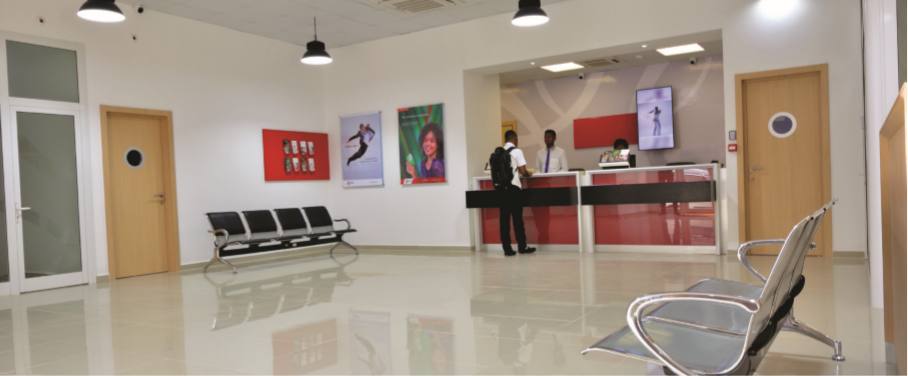
Welcome to Nosy Be
MCB Madagascar opened its 11th branch in Nosy Be in December.
MCB Maladives
- During the financial year, a major expansion was registered in respect of the bank’s deposits base on the back of efforts to boost and diversify its funding and liquidity position, while the loan book declined on a point-to-point basis, reflecting the prudent approach adopted for the deployment of credit facilities in the wake of the challenging operating environment and early debt settlements by some customers. Notwithstanding such dynamics, MCB Maldives registered an appreciable growth in net interest income, mainly attributable to (i) releases in interest suspense subsequent to recoveries on various non-performing loans; (ii) a rise in investment in securities amidst the active deployment of liquidity management initiatives; and (iii) higher placements with banks. As for operating income, it posted a strong growth of 13%, spurred by an increase in net fee and commission income linked to retail banking fees and card transactions as well as a significant hike in profit on exchange as a result of increased turnover and higher margin on related transactions. On the other hand, operating expenses increased by 12% due to additional staff recruitment to support business development initiatives as well as higher management and consultancy fees. Notwithstanding heightened impairment charges associated with a more prudent approach to provision coverage on NPLs – with recovery efforts being pursued in a testing economic landscape – attributable results for the year registered an appreciable increase of 12% to stand at MVR 30 million, with the bank contributing around Rs 68.0 million to Group results.
- In line with its risk appetite, the bank laid increased emphasis on established corporates with proven track record, alongside ensuring that it adopts a prudent and selective approach with a view to promoting a sound and efficient customer onboarding exercise. MCB Maldives has partnered with a number of leading hotel groups, while leveraging its unique selling propositions. It offered several products and services not available at other banks to the latter clients, in addition to providing them with a streamlined process with a view to onboarding their expatriate personnel, as part of ongoing strategies to develop the retail segment and position the bank as a trusted partner in this field. Headway on this front can be further gauged by the bundled package that the bank offers to its affluent customers, while it is, furthermore, on course to set up a new business segment to provide more enriching experiences to its mass affluent segment. To support its strategic thrusts, MCB Maldives adopted dedicated moves to bolster the quality of its human capital. A new performance management method has been adopted and key recruitments across important positions have been undertaken across the bank. The latter also sustained its investment in human capital development by conducting several training programmes, either in-class, online or via placements, notably spanning trade finance, e-commerce, cards as well as health and safety. Importantly, the bank engaged with MCB Group to be part of its HR Transformation Programme, to further improve talent management and underpin the adoption of best practices, notably in terms of HR policies and procedures. The bank further streamlined its back-office activities and upgraded its systems and processes to foster enhanced operational efficiency and customer service levels.
MCB Seychelles
- In FY 2018/19, while the overall deposit base witnessed a double digit growth on the basis notably of competitive interest rates offered, MCB Seychelles posted a significant growth of 24% in its loan portfolio. In addition to further inroads realised in serving retail customers, the latter outcome was mainly driven by the expansion in long-term corporate loans provided to finance various projects being undertaken within the tourism, construction and trading sectors in particular. Against this backdrop, net interest income grew by 9%, which is relatively lower than the above-mentioned loan book expansion, to the extent that the latter has mainly occurred during the second half of the financial year. Whilst a decline was registered in profit arising from dealing in foreign currencies, operating income rose by 8%, backed by a sustained increase in net fee and commission income due mainly to higher card-related transactions and loan-related fees. Operating expenses grew substantially, largely on account of investment in human capital, while being additionally impacted by higher depreciation and amortisation charges as well as increases in management fees. Overall, after factoring in a fall in net impairment of financial assets amidst noticeable headway made in improving the quality of the bank’s portfolio and a major rise in income tax expense, partly linked to a one-off tax credit recorded in the preceding financial year, attributable profits for the year increased by 4% to reach SCR 82.9 million. As a result, the bank contributed Rs 210.5 million to the Group profits.
- The bank pursued its business growth, while enriching its suite of products and services. It launched the ‘JuiceByMCB’ mobile banking application, thus providing customers with a comprehensive set of online banking and payment services. Reflecting the bank’s commitment to supporting the rapid growth of the Seychelles main business district, the newly-relocated Providence Branch was inaugurated in February 2019, portraying a more modern and spacious layout, while incorporating an appealing palette of offerings for both individual and corporate customers. On another note, the bank further broadcast its value proposition via digital display screens that have been installed throughout its branch network. The entity fostered greater brand visibility through the participation in and sponsorship of various commercial initiatives and events. It signed up as the Official Partner of the local team for the 10th Indian Ocean Island Games and was the main sponsor of the first International Golf Tournament in Seychelles. From an operational efficiency perspective, MCB Seychelles upgraded its infrastructure to optimise the performance of its banking system with a view to providing seamless service to its growing client base. Capacity building was also fostered by means of employees getting the opportunity to avail of online courses, including those offered by MCB Institute of Finance. Furthermore, MCB Seychelles launched its first InnovChallenge, which is a competition giving employees the opportunity to present innovative ideas that can be transformed into efficiency improvement initiatives for the bank.
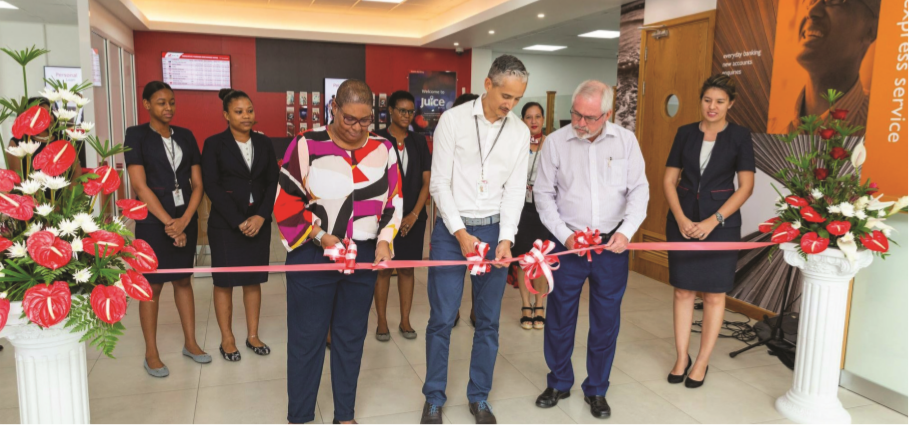
Brand new Providence branch
The doors of the new Providence branch in Seychelles opened in February
Foreign banking associates
- Amidst heightened competitive pressures and the challenging economic landscape, BFCOI’s loan book grew by around 4% to reach EUR 1.6 billion, while its deposit base remained fairly stable. Consequently, after making allowance for a major rise in borrowings and the higher cost of funding, the bank posted a growth of 2% in its net interest income. Net fee and commission income grew by 11%, on the back of an increase in the volume of general banking transactions and credit-related fees. Against this backdrop, operating income increased by 7%, in spite of the fact that the bank benefitted from one-off profit emanating from the disposal of an investment during the preceding financial year. For its part, operating expenses hiked by 10% on account of capacity building initiatives put into place and the fact that the bank had, during FY 2017/18, registered a non-recurring credit in the form of the write-back of excess pension provisions for Mayotte. Impairment charges increased significantly owing to a rise in specific provisions and expected credit losses recorded in relation to Stage 2 customers following adoption of the IFRS 9. Overall, profits attributable to shareholders fell by 42%, in view of the non-recurring items referred to above. When excluding the latter, results would have remained flat. During FY 2018/19, BFCOI contributed Rs 241.2 million to Group results. It remained comfortably capitalised, with capital adequacy ratio of 16.3% as at 30 June 2019, of which 13.2% by way of Tier 1 capital.
- While reaping the benefits of business development strategies executed over time, including reinforced customer acquisition efforts, Société Générale Moçambique saw its overall loan book expanding by more than two and a half times during the last financial year on the back of rising exposures to corporates operating across various economic sectors. As for deposits from customers, they grew by 26%. Consequently, in spite of a point-to-point decline in investment in Government securities and a fall in average yields thereon, net interest income increased by 18%, with this outcome being also significantly boosted by a major decline in interest expense amidst the drop in interest rates. As for operating income, it rose by 33%, on the back of net fee and commission income more than doubling owing to improved trade finance activities as well as higher corporate and transaction-related fees, while profit on exchange edged up as a result of the greater volumes of deals struck. Whilst human resource expenses and depreciation costs increased on the heels of higher salaries and investments incurred to underpin the expansion of the branch network, operating expenses declined by 17%, owing mainly to lower amortization and rental costs as well as a relative fall in technical and management fees. Overall, after making allowance for major net recoveries in respect of credit impairment charges, the bank posted a small profit, thus contributing Rs 0.7 million to Group results during the year under review. As another source of satisfaction, the bank stayed firmly capitalised, with both Tier 1 ratio and capital adequacy ratio standing at 22.8% as at 30 June 2019. Of note, in May 2019, the bank increased its share capital by MZN 500 million (around USD 8 million) to meet regulatory requirements and support its growth strategies.
Non-banking financial cluster
MCB Capital Markets Ltd and its subsidiaries (MCBCM)
- In FY 2018/19, consolidated revenue and profit after tax amounted to Rs 453 million (FY 2017/18: Rs 392 million) and Rs 231 million (FY 2017/18: Rs 173 million) respectively. MCBCM’s results continued to be driven primarily by the successful completion of corporate finance transactions, while a slight increase in assets under management was recorded.
Corporate Finance Advisory
- Carried out 7 capital raising transactions for local and foreign corporate clients
- Arranged approximately Rs 9 billion in debt capital market transactions for local clients
- Acted as Advisor to Teyliom, a diversified group based in Ivory Coast, on structuring and arranging a EUR 45 million financing package, comprising both equity and quasi equity, towards the construction of a chain of business hotels in West Africa
- Advised NMC Healthcare LLC, the leading private provider of health care services in the Middle East, on a USD 30 million private debt placement
- Advised MMI Holdings, one of the largest financial services groups in South Africa, on the disposal of its Mauritian subsidiary
Looking ahead, MCBFA will maintain focus on its two key objectives, namely providing bespoke solutions to its corporate clients’ financing and strategic issues as well as developing the local debt capital markets. Amongst other things, this means establishing transparent risk-based pricing across the MUR yield curve, introducing innovative and flexible financing instruments, and broadening the spectrum of financing options available to borrowers.
Investment Management
- Gathering retail assets proved to be challenging for MCB Investment Management (MCBIM) in FY 2018/19, in the wake of the launch of Governmentbacked securities at relatively attractive rates and the opening of the secondary market in Government paper to the general public. Specifically, growth in our retail funds was held back by the Government’s Jubilee Bond issue, which raised some Rs 9 billion in the last quarter of the financial year and the offering of Government bills and bonds across the retail network. We estimate that take-up of Government paper by retail investors amount to approximately Rs 35-40 million per week.
- MCBIM, in partnership with the African Development Bank, launched the African Domestic Bond ETF, the first multi-jurisdictional African fixed income ETF, in September 2018. The fund aims to give investors access to local currency African fixed income markets through a cost effective vehicle listed on the Stock Exchange of Mauritius. The ETF, and the asset class it provides access to, has outperformed its global peers since launch and continues to generate significant interest, as can be seen from the following table. The fund paid an interim USD denominated dividend of USD 0.58 per share (~5.8% dividend yield) in April 2019 and intends to pay a dividend every six months.
- Other MCB funds that performed strongly in FY 2018/19 include the MCB Cash Management Fund, which generated an annualised USD return of 3.05% to 30 June 2019 and the MCB Overseas Fund, which generated a return of 5.9% in MUR for the same period.
- Looking ahead, growth in retail assets under management is likely to remain under pressure following the issuance of new Government-backed securities in July 2019, namely the Silver Savings Bond and the Silver Retirement Bond, which are expected to raise Rs 8 billion. Nevertheless, we are confident that our funds will remain appealing to investors seeking to diversify their investments. In the coming years, we will continue to rationalise our range of funds in order to focus our investment managers’ efforts on areas where they have particular strengths and are able to generate above market returns for clients. These include African local currency fixed income, USD cash management as well as Mauritian equities and fixed income.
Stockbroking
- This financial year saw a relatively difficult trading environment as total market value traded registered a 23% decline compared to FY 2017/18. This resulted in lower brokerage revenues of approximately 20% year-on-year. On the positive side, MCB Stockbroking maintained its leading position in terms of market share on account of an increase in foreign activity, which represented over one third of total market turnover. Operating income was down 21% after making allowance for smaller underwriting transactions, which were partly compensated for by higher distribution income from the placing of a capital-protected note, that raised close to Rs 300 million from individual investors. The issue of the Golden Jubilee Bond in March 2018 and the opening of the secondary market in sovereign debt to the general public have resulted in individuals becoming more active in seeking attractive yields for their savings. Indeed, Government-backed securities have so far been more attractively priced than commercial bank deposits. This change in behaviour has created an opportunity for MCB Stockbroking to innovate by introducing the first Credit-Linked Note to the general public through a listing on the Stock Exchange of Mauritius.
Registry & Transfer Agent
- MCB Registry and Securities produced notable results with revenue growth of 15% from the high base of FY 2017/18. The results were driven by sustained corporate activity in both the debt and equity capital markets. The company has, this year, embarked on an investment plan for both its human capital and technology to be able to sustain revenue growth in the coming years.
Private Equity
- MCB Equity Fund is a USD 100 million evergreen fund that provides expansion capital to established businesses with solid growth prospects, healthy profitability and strong management teams in Africa. The fund counts MCB Group Ltd as its sole Limited Partner and is managed by MCB Capital Partners Ltd, a wholly owned subsidiary of MCB Capital Markets Ltd.
- Assets under management, on a fair value basis, stood at Rs 3.2 billion as at 30 June 2019 while the Net Asset Value of MCB Equity Fund Ltd rose from Rs 3.6 billion in FY 2017/18 to Rs 3.7 billion in FY 2018/19. During the financial year, the fund realised net profits of Rs 10 million from the disposal of its financial assets. Unrealised gains in the fair value of its financial assets amounted to Rs 62 million. Dividend income amounted to Rs 31 million in FY 2018/19 compared to Rs 33 million in FY 2017/18.
- During the year under review, MCB Leasing Ltd’s operations continued to be impacted by a highly competitive commercialenvironment and by high levels of liquidity in the market. The lease portfolio grew by 1.9% to reach Rs 4,173 million (2018: Rs 4,094 million), with the finance lease portfolio down by 0.7% to Rs 3,479 million whilst operating leases increasing by 17.4% to now stand at Rs 693.8 million. Despite a flat finance lease portfolio, net interest income grew by 11.8% to Rs 98.1 million as a result of the refinancing of a shareholder loan at the end of the previous financial year leading to a reduction of interestexpense of Rs 7.9 million as well as a marginal drop in the cost of deposits. Other income (comprising principally operatinglease income net of depreciation charges on leased assets) increased by Rs 13.6 million to Rs 76.1 million in line with thesignificant growth of the operating lease portfolio. Altogether, operating income increased by 16.0% to reach Rs 174.1 millionfor the year ended 30 June 2019. On the expenses side, operating costs increased by 3.6%, up Rs 2.7 million to Rs 76.8 million,the increase in staff expenses on the back of some capacity building initiatives during the year, being compensated to a large extent by a significant drop in impairment charges as a result of a closer monitoring of underperforming leases. Furthermore,the tax charges dropped by more than 50% to Rs 7.3 million due to the recent changes in legislation. As a result of the above,with operating income growing faster than operating expenses, net profit increased by 44.0% from Rs 62.9 million to Rs 90.6 million.
MCB Factors Ltd is positioned as a prominent player in the field of factoring in Mauritius. In addition to offering full salesledger administration service to its customers, the entity provides funding against the assignment of trade receivables. Onthe domestic market, both recourse and nonrecourse factoring are proposed, with the latter implying protection againstdebtors’ insolvency. On the international front, Mauritian importers and exporters are offered import and export factoringsolutions. MCB Factors contributed Rs 48.3 million to Group results for the year under review. For FY 2019/20, emphasis is being laid on improving customer experience, enhancing risk management and further diversifying the palette of invoice finance products.
- As part of MCB Group’s pledge to fostering the financial inclusion and empowerment of small entrepreneurs, MCB Microfinance Ltd was launched in July 2016 as a wholly-owned subsidiary of MCB Group Ltd. Its aim is to facilitate access to business loans for micro-enterprises and self-employed individuals. Clients have access to two types of micro-loans: (i) working capital loans, which aim at meeting the working capital needs such as raw materials or stock; and (ii) investment loans, which are targeted to meet the capital spending requirements of businesses. The entity lays due emphasis on customer proximity, with its Relationship Officers dedicated to spending adequate time on the field to suitably understand the characteristics and requirements of clients with a view to offering them customised solutions that suit their repayment capacities.
- As at 30 June 2019, MCB Microfinance has disbursed 2,762 loans, corresponding to a gross amount of some Rs 528 million. 55% of the loans disbursed were investment loans, with the remaining being working capital loans. It is worth highlighting that the performance of MCB Microfinance has been better than what was initially projected, with a significant gross loan portfolio of around Rs 274 million being posted as at 30 June 2019. It can be recalled that, in March 2017, MCB Microfinance had extended its activities to Rodrigues, with the opening of an office and the recruitment of two Relationship Officers. As at 30 June 2019, 188 microloans have been disbursed in Rodrigues, corresponding to a gross amount of Rs 24 million. Whilst MCB Microfinance registered a small loss of around Rs 4.2 million in FY 2018/19, it is moving further towards break-even point on the basis of its business development momentum.
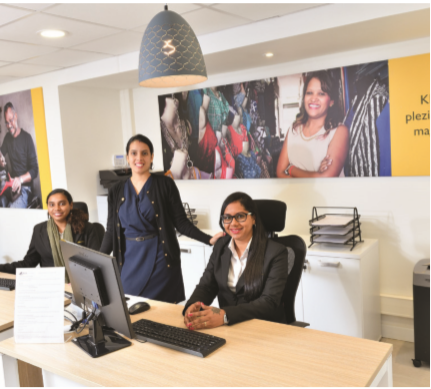
MCB Microfinance celebrates its third anniversary
As it celebrated its third anniversary, this subsidiary of MCB Group also relocated its main office to Curepipe.
- In October 2017, MCB Group announced its real estate investment strategy, whereby the Group will act as seed investor for the acquisition of prime real estate assets with a view to giving investing customers access to an attractive income yielding asset class. The real estate investment activity is conducted through MCB Real Assets (MCBRA), a wholly owned subsidiary of MCB Group Ltd. Simultaneously, MCBRA announced the completion of the EUR 58.8 million acquisition of a 84.4% stake in Compagnie des Villages de Vacances de L’Isle de France Limitée (COVIFRA), owner of the Club Med hotel resort located at La Pointe aux Canonniers, Mauritius (the ‘Resort’). As part of the transaction, MCBRA entered into a triple net lease with Club Med S.A.S.
- COVIFRA is listed on the Development and Enterprise Market of the Stock Exchange of Mauritius. MCBRA’s shareholding of COVIFRA currently stands at 93.4%, having acquired an additional 9% stake as part of a mandatory offer to the minority shareholders and a subsequent rights issue. In FY 2018/19, MCBRA received dividends of MUR 75 million from its investment in COVIFRA. During the last financial year, COVIFRA undertook a refurbishment and extension of the Resort, which involved major renovation works and the construction of 108 additional rooms, taking the total to 394. The construction was completed in November 2018 at a cost of approximately MUR 1.6 billion, which was financed by the rights issue of MUR 260 million and additional debt. MCBRA subscribed fully to its pro-rata share of the rights issue and to some excess shares. In FY 2018/19, COVIFRA’s Management team also focused on optimising the cost of debt of the company. As part of this exercise, EUR 15 million of bank debt was refinanced by a 10-year bond issue. COVIFRA’s investment property was valued independently by Jones Lang LaSalle (Pty) Ltd at EUR 99 million, which resulted in a fair value gain of approximately EUR 3 million.
- During FY 2018/19, total contribution of MCB Real Assets to Group results amounted to Rs 207 million.
- Over time, MCBRA intends to sell down its investments to third parties.
- This associate, in which MCB has a 40% stake, is a joint venture with La Prudence Holding and provides credit insurance services to its customers by ensuring protection in respect of their trade receivables. For the year ending 30 June 2019, the contribution to Group results stood at around Rs 0.3 million.
Other investments cluster
- Fincorp Investment Ltd (Fincorp) is an investment company which is listed on the Official Market of the Stock Exchange of Mauritius Ltd. Its financial performance is directly correlated to that of its two main investments, namely MCB Leasing Limited (‘MCB Leasing’ and formerly Finlease Company Limited), its 100% owned leasing company, and Promotion and Development Limited (PAD), which is an investment company that is also listed on the local bourse and in which Fincorp Investment Ltd has a 46.4% stake.
- Fincorp posted a consolidated profit after tax of Rs 213 million for the financial year ended 30 June 2019 compared to a loss of Rs 8.7 million last year. While benefitting from the improved results of MCB Leasing as explained earlier, this was mainly driven by an upturn in the performance of PAD, whose contribution to Fincorp group’s results shifted from a loss of Rs 42.2 million in FY 2017/18 to a profit of Rs 152.0 million. This is mainly explained by an enhanced performance of its subsidiary, Caudan Development Ltd (Caudan) and of its associates, notably at the level of Medine Ltd (Medine). Caudan’s results were favourably impacted by the fair value gains from the revaluation of its investment property. For its part, after having incurred significant losses linked to impairment of its milling assets in FY 2017/18, Medine this year recorded a significant increase in profits from the sale of land, fair value gains from the revaluation of its investment properties, as well as lower operating losses following reduced overheads.
- On the whole, Fincorp made a contribution of Rs 122 million to MCB Group results, after deduction of minority interest of 43%, compared to a negative contribution of Rs 5.0 million in FY 2017/18. The net assets value per share amounted to 53.98 at June 2019, representing a rise of 2.5% from last year’s value of Rs 52.65.
- As part of the Group strategy, ICPS has, over the past decade, positioned itself as a prominent player providing multi-channel card, mobile and e-commerce payment solutions across the value chain of issuing, acquiring and switching by providing connectivity to existing card associations. In the midst of the fourth industrial revolution and the wide-ranging adoption of digitally-enabled technologies, ICPS is constantly reviewing its model. The aim is to continue building a robust open platform around payment, notably encompassing a broadening range of digital products with analytics, backed by investment in research and development, with a view to providing the best innovative solutions and services to hosted banks. Today, ICPS acts as an enabler for its clients located in Mauritius, the Indian Ocean, key African economies and Asia, providing an end-to-end integration of services and functionalities. Leveraging the new version of its payment system as well as its talented and committed workforce, ICPS is pursuing heavy investments in technology and developing its pipeline of talents. With proven capabilities in consultancy, business operations outsourcing, training, system implementation, a Card personalisation bureau service and information security advisory services, the company has extended its footprint in 20 markets across Africa and Asia. Despite the challenging regulatory landscape and demanding industry standards, ICPS has sustained a strong business growth, with a turnover of Rs 287 million in FY 2018/19. For the first time, the company entered the South East Asian market, with a first bank on-boarded for payment processing. In the year ahead, ICPS will maintain its diversification and transformation strategy to succeed in this dynamic operating environment.
- Established in June 2014 as a fully-owned subsidiary of MCB Group Ltd, MCB Consulting Services offers consulting services, articulated around the four pillars of any company (i.e. process, people, technology and strategy) to organisations, mainly those operating in the financial sector. Over the last five years, this now truly international company – manned by around 90 employees of different nationalities – has undertaken more than 450 assignments (including above 130 over the last financial year) in 35 different countries (with 7 new countries, including Canada and Cambodia, adding up since June 2018). During the year under review, turnover exceeded the USD 7 million threshold, while profit after tax shot up by 82%, in line with set objectives, to attain around USD 714,000. Broadly speaking, this performance was underpinned by the diversification of activities in terms of countries of operations, new clients and economic sectors. Interestingly, the following are worth highlighting: (i) our sources of revenue are predominantly spread across 4 distinct regions, i.e. English-speaking Africa, French-speaking Africa, Indian Ocean and Middle East; (ii) no country and/or client represents more than 10 % of our total revenue; and (iii) income from the non-financial sector now accounts for 5 % of our total turnover. In addition, our financial results have been supported by several other enablers, with key areas of satisfaction relating to the following: (i) handful of newly-signed strategic partnership agreements with global software vendors and consulting firms; (ii) the successful launch of new services, with positive client feedback being recorded; (iii) the consolidation of our mainstream line of business (i.e. Temenos-related products) through the signature of high-profile contracts in the more sophisticated traditional markets; and (iv) the ability to recruit locally and outside Mauritius.
- Looking ahead, our judiciously crafted business development strategy, the uniqueness of our value proposition in this market space, our competent staff and our commitment to serve clients should, despite some typical headwinds, remain key enablers for consolidating our business, in alignment with our says-it-all tagline which highlights our role as being positively disruptive in the markets in which we operate. To pursue our growth, we will notably take advantage of our new brand identity, which was unveiled in June last after a thorough exercise that benefited from the technical expertise of an independent specialised firm.
The Group believes in fully appreciating the realities, opportunities and challenges that financial professionals face in a complex, fastpaced and ever evolving environment. Similarly, we seek to pursue our ambitions by capitalising on an adequately trained and technically competent employee base. Mindful of such a context and fortunate to have found a reputable local firm sharing the same vision, MCB Institute of Finance (MCBIF) was incorporated in February 2019. It aims to become a place where great minds converge, ideas sparkle and knowledge and cooperation lay the groundwork for a strong and reliable network between students and professionals. While positioning itself as a generic curator with a marquee line of specialisation in banking and finance, MCBIF offers an interesting combination of in-class and on-line courses that are offered by carefully selected partners, notably Université Paris II PanthéonAssas, Emeritus Institute of Management and Retail Banking Academy. Since April 2019, taking advantage of these partnership agreements, 11 courses have been launched, while a major conference (around the banking mediation, Fintech as well as Data & Artificial Intelligence themes) was held in last July. Overall, after around four months of existence, it is interesting to note that the total registered number of students has exceeded by 215% the initially planned number of annual registrations. The above, alongside forthcoming courses and partnerships that are in the pipeline, confirm that, in fine, MCBIF can legitimately aspire at becoming an African reference in the emergence and support of financial sector talents.
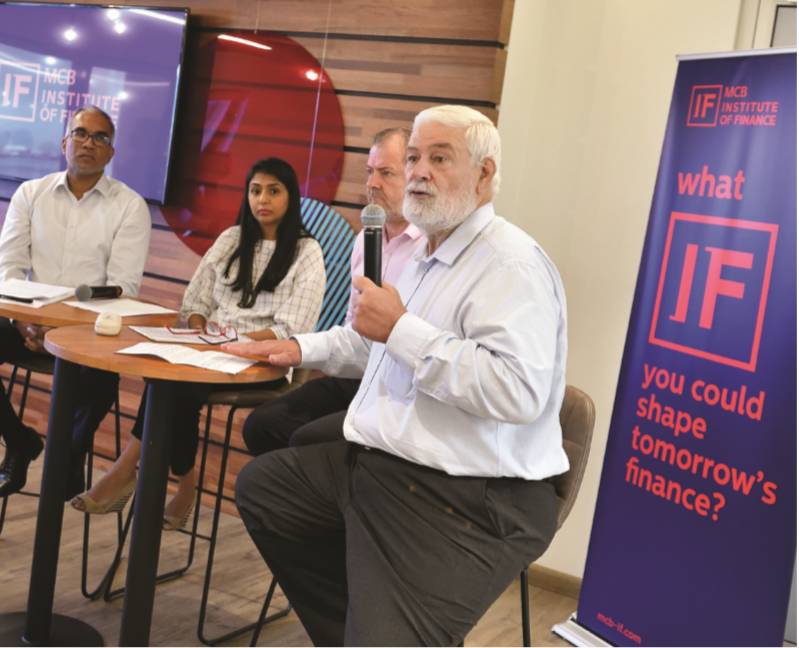
Launch of MCB Institute of Finance Ltd
Born out of a shared vision of the MCB Group and Uniciti Education Hub, MCBIF provides the most relevant courses to develop the financial know-how of professionals and students alike.
- The MCB Forward Foundation is the Group’s vehicle responsible for fulfilling its corporate social responsibility. Its vision is to be instrumental in the creation of sustainable value for the social, environmental and economic well-being of society through the provision of human, logistical and financial resources in support of specific initiatives. For the year under review, an aggregate amount of around Rs 54.7 million was entrusted to MCB Forward Foundation to be leveraged for spending on relevant projects, after making allowance for the Government policy that 50% of CSR contributions by local entities for projects initiated prior to January 2019 should be channelled to the Mauritius Revenue Authority (MRA). This official measure has jeopardised the execution of long-term projects that the Group had earmarked for the promotion of social welfare and empowerment. In fact, no full-fledged ‘appel à projets’ could be initiated by the Group for the year under review. For the current financial year, the share of CSR contributions to be channelled to the MRA is set to rise to 75%, thus further curtailing the level of financial resources available to the MCB Forward Foundation to comprehensively implement its CSR programme.
- This company, which runs the museum located in the Caudan Waterfront, represents one of the contributions of MCB Group Ltd to the promotion of arts and culture, and, more generally, the protection of the national heritage of Mauritius.

© 2019 MCB GROUP LTD #Success Beyond Numbers

